#irish social media has been brutal GOOD FOR THEM
Text
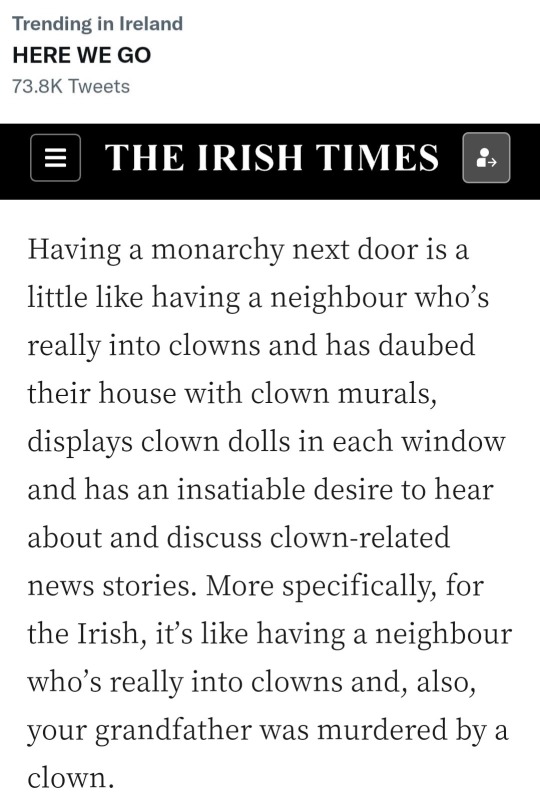
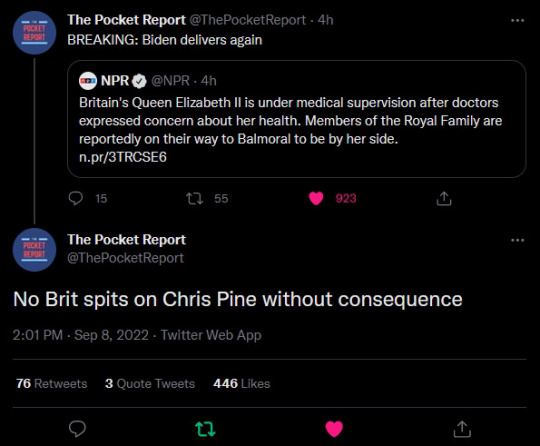
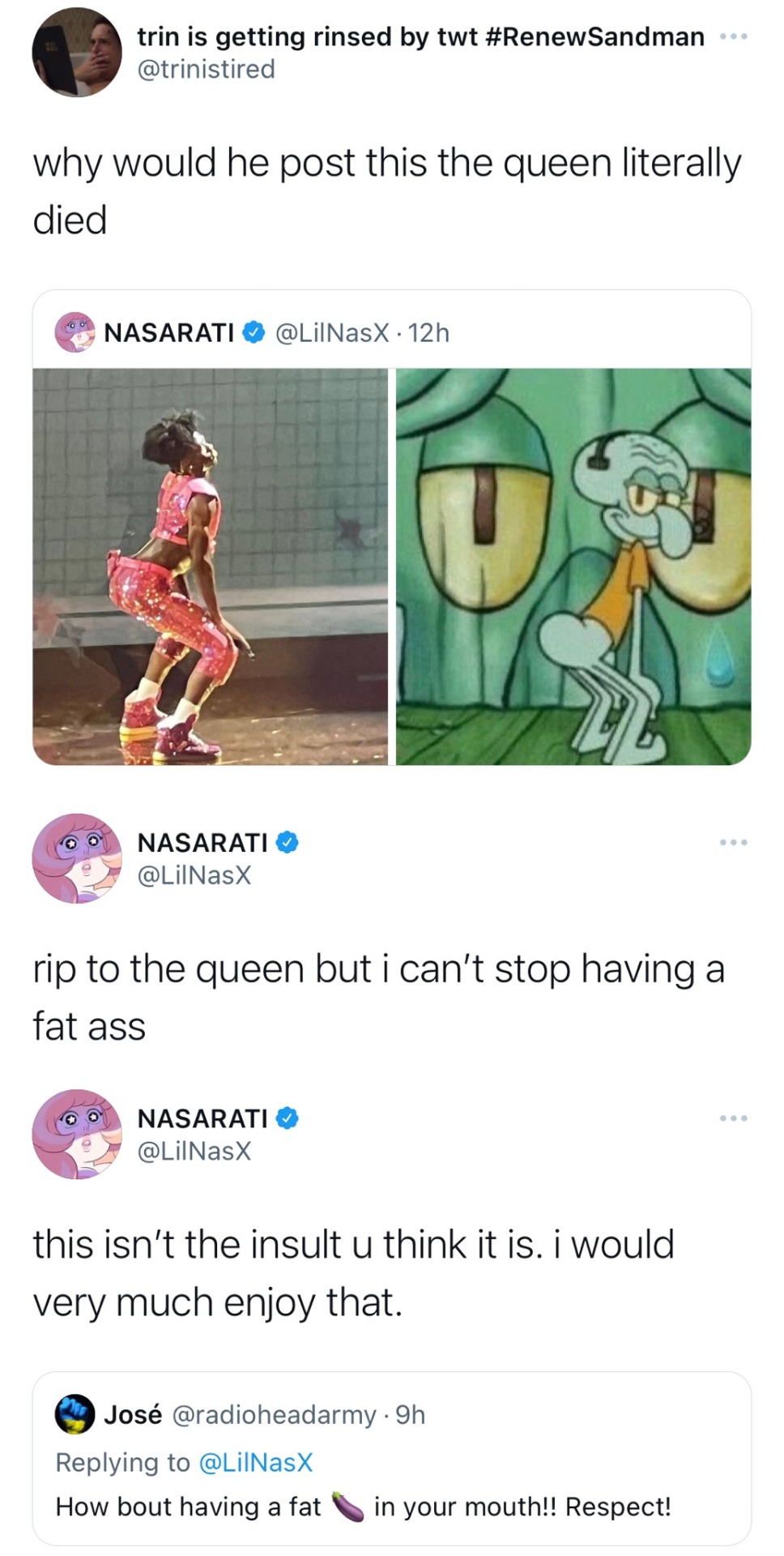
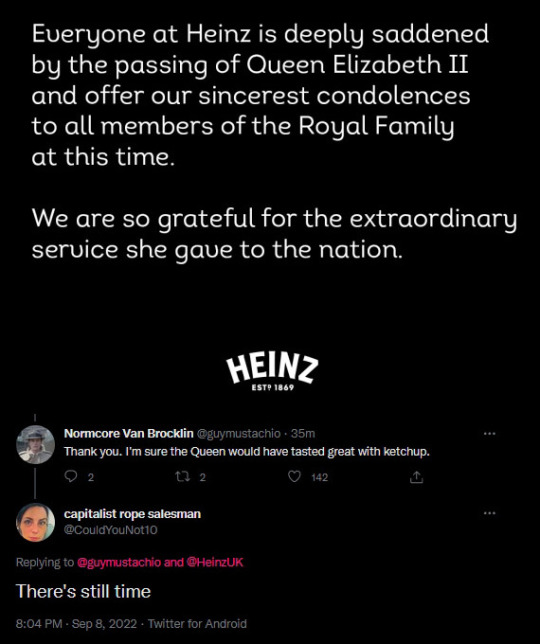
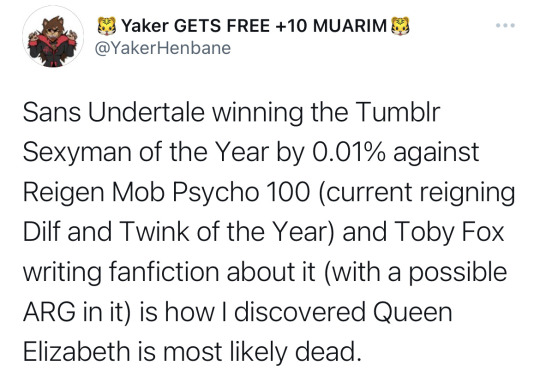

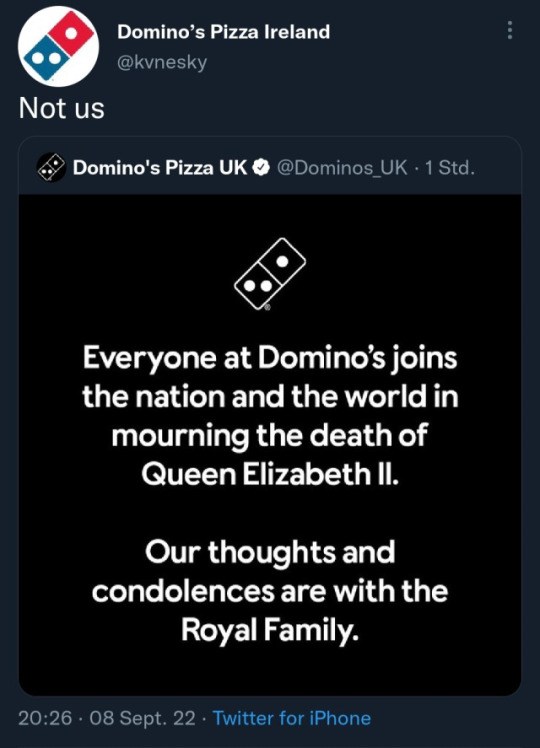
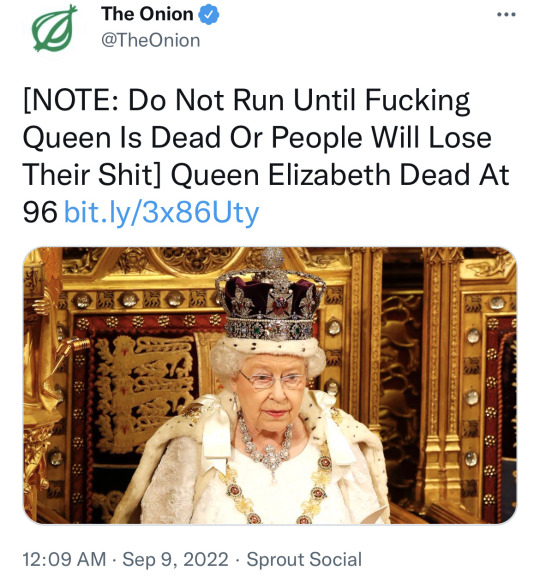
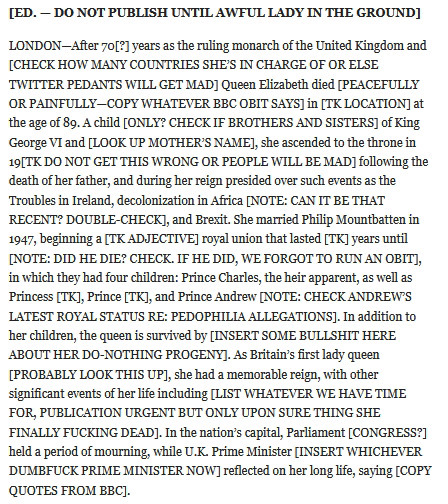
the queen is dead: an internet round-up (plus: argentinian journalist celebrates her death)
#that video is so 😳👀#irish social media has been brutal GOOD FOR THEM#queen elizabeth#uk#ireland#england#uk politics#british royal family#undertale#mp100#mob psycho 100#princess diana#supernatural#chris pine#harry styles#history#christopher eccleston#don’t worry darling#twitter
48K notes
·
View notes
Text
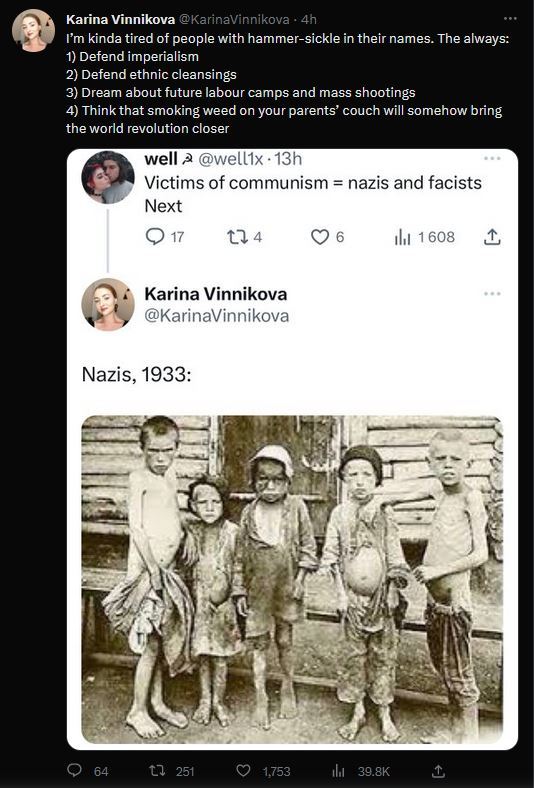
The word "Nazi" has a specific meaning to normal people, but to vatniks and tankies it has five basic meanings….
"anybody I don't like"
"anybody who disagrees with me"
"anybody who's a citizen of a country that Russia wants to invade"
"anybody who opposed or simply didn't want to live in one of the tyrannical regimes I simp for"
"anybody who was oppressed or killed by one of my favourite mass murderers"
EDITED TO ADD: a tankie clown reblogged this post and made some typically asinine comments, so I thought I'd elaborate a little bit….
Tankie clown: @well1x is either referring to the fact that a lot of the "deaths under communism" listed in "the black book of communism" (which gives us the 10 million number or whatever) are quite literally Nazis in WWII, or they're referring to the fact that the only people who have been made to deliberately suffer under communism have been literal Nazis and fascists (generally speaking)
Joining the tankie cult requires you to live in a delusional clown world and believe in a shit ton of made up (and often contradictory) nonsense that requires a considerable repertoire of mental gymnastics (and lies) to maintain….
@well1x is literally trying to claim that all victims of communism are "nazis and facists" (sic), which - back in the real world - is a very obvious lie. It's also a blatant example of victim blaming. For example, most of the millions of men, women and children who were robbed, raped, imprisoned, sent to the gulags, tortured, starved to death, executed or ethnically cleansed by Stalin's henchmen were not Nazis or fascists, and many were innocent of any crime. The vast majority of the population in Stalin's Soviet Union also had to put up with crippling poverty and backwardness, the brutal suppression of their religious and community life and the total lack of freedom.
Based on his comment, I doubt if the tankie clown has ever read "the black book of communism" and I'm also not sure why he mentions this book in particular, when there are thousands of others that thoroughly document the numerous crimes of the regimes tankies insist on being the useful idiots for, and I think it's safe to assume that he hasn't read any of those books either (in fact, I doubt if he's ever read any book whatsoever)….
Tankie clown: Karina then shows an image of (presumably) some kids in the Ukraine famine. This is completely unrelated though because this famine was not manufactured by the USSR as say the Irish famine was by the English. Can't really attribute natural disaster to "muh communism"
Again - a typical genocide-denying tankie lie.
Tankies generally start by saying that the holodomor was Nazi propaganda, and when you debunk that they claim it was just a natural disaster, and when that doesn't work they make up some bullshit about how millions of farmers who barely had enough to live on were wealthy kulaks who burned crops and slaughtered cattle (and therefore deserved to die). And when you point out that the red army actually broke into their homes and confiscated all their grain, every cow or chicken or any other food they had, and that the Soviet authorities blacklisted villages, sometimes purely for containing relatives of Ukrainian independence fighters, and prevented the villagers from leaving, shot them for even collecting ears of grain from the fields, and watched them starve to death - tankies will just deny it, or laugh, or pretend that millions of holodomor victims were all rich landlords (and therefore deserved to die) etc etc….
I've also never seen English people pretending that the Irish famine never happened, or claiming that the victims deserved it, or that it was a good thing, or that Britain should re-conquer Ireland. On the other hand, it's difficult not to notice Stalin's smooth-brained groupies swarming all over social media every day denying or justifying the holodomor and other crimes of Russia and the USSR, and hoping that Russia not only re-conquers Ukraine but also Finland, the Baltics, Poland and other countries it has invaded and occupied in the past.
There's no point trying to reason with tankies using facts, logic or common sense - and appealing to their sense of decency while they're simping for their favourite mass murderers is a complete waste of time.
Tankie clown: Karina then says @well1x is defending imperialism(???), defending ethnic cleansing (which …what??), dreaming about labour camps and mass shootings (for Nazis yes plz), and does not do any praxis (based on?).
Yep - most tankie clowns claim to be communists while simultaneously embracing Russian fascism, supporting the imperialism of Russia’s mega-rich ruling class, mindlessly repeating the Kremlin's propaganda and cheerleading their war crimes. These morons seem to have no idea that the Russian Federation is an empire made up of many conquered states that Russia invaded, occupied and colonised in the 16th, 17th, 18th, 19th and 20th centuries, or that Russia's war against Ukraine is a brutal attempt to reassert control over one of its former colonies. Russia's history of imperialism is at least as bad as that of any western country - and they're still doing it in the 21st century.
And I have seen countless examples of tankies speaking openly of wanting to mass murder their ideological enemies (or people they don't like) - because they also delude themselves into believing that if their revolutionary dreams ever came true, they'd be the ones doing the arresting and killing, despite the fact that in a real revolution they'd be about as much use as a fart in a spacesuit. They also have no idea how their small dick energy is somehow going to bring capitalism to its knees, which they'd inevitably end up crying about if it ever actually happened in reality.
Most of them are complete losers who spend the majority of their time sitting in their bedrooms huffing their own farts while reading tankie fan fiction online. Tankie clowns also claim to be against western imperialism and capitalism, despite living comfortable lives in western capitalist countries and owing everything they have to capitalism, including the freedom to use their capitalist smartphones or laptops to post anti-capitalist tantrums on social media platforms owned by western capitalists (thus helping these western capitalists to maximise their profits).
This is generally the sum total of a typical tankie's - ahem - "revolutionary" activity.
The vast majority of tankie clowns wouldn't dream of ever giving up the comforts of capitalism to move to one of the authoritarian shitholes they stupidly simp for, because then they might not be able to play their favourite capitalist video games anymore….
It's also a fact that Russia and the USSR have ethnically cleansed millions of people.
Tankie clown: OP takes this insane train all the way to the station, and says @well1x is talking about anyone they don't like which… no. They're talking about the traditional Nazis.
No - they're falsely claiming that all victims of communism are Nazis and fascists. Learn to read….
Tankie clown: But also let's break this down. Who does OP think is being called a Nazi? "anyone I don't like" I mean I don't like Nazis, but I don't think everyone I don't like is one lmao. Funny tho, dude throws around the word tankie until it has no meaning.
In my experience, if you disagree with tankies about anything, they will pretty soon call you a fascist or a Nazi. It's they who throw around words like "fascist" and "Nazi" until they have no meaning (and most of them hilariously claim to be opposed to fascism while simultaneously supporting it - if it happens to be Russian).
Tankie clown: - "anyone who disagrees with me" if you disagree that all human beings deserve to live a dignified life regardless of race/sex/gender identity/sexual orientation/age/disability/whatever then yeah you probably are a Nazi
Straw man. See above….
It's also amusing to observe the doublethink of somebody who apparently believes that "all human beings deserve to live a dignified life" while simultaneously thinking that when his favourite mass murderers oppressed and/or killed huge numbers of people it was perfectly OK….
Tankie clown: - "anyone who's a citizen of a country that Russia wants to invade" why the fuck are we talking about Russia? Believe it or not OP, USSR does not stand for "United Soviet States of Russia" lmaoooo
We're talking about Russia because most tankie clowns support Russian imperialism and mindlessly parrot the Kremlin's propaganda about how Russia's latest invasion of Ukraine is some sort of special de-nazification operation (see above). Tankies are generally so ignorant, gullible and stupid that they will literally believe anything the Kremlin tells them….
Tankie clown: - "anyone opposed or simply didn't want to live in one of the tyrannical regimes I simp for" tyrannical regimes lmao. These were only "tyrannical regimes" for people who actually were in fact Nazis.
Again - this is the kind of reality-denying nonsense I'd expect to hear from a tankie clown. One thing that really appalls people in the central and eastern European countries that experienced the reality of being occupied by the USSR and/or Russia, is the staggering ignorance and stupidity of western useful idiots who have no idea what it was actually like, and are not only dumb enough to join the tankie cult, but insist on westsplaining to the victims and their descendants about how the horrors they and their families suffered (usually for doing literally nothing) either didn't happen ("cuz the CIA made it all up") or claiming that they somehow deserved it ("cuz they were all Nazis/fascists/kulaks/slave owners").
Back in the real world, these were tyrannical regimes for tens of millions of ordinary people who had done nothing to deserve being subjected to tyranny….
Tankie clown: - "anyone who was oppressed or killed by one of my favourite mass murderers" yeah basically that's what I've been saying.
Thanks for proving my point….
And please note that smoking weed on your mum's sofa isn't actually going to bring the world revolution closer.
That was just a joke…. 🤣😂
#vatnik#tankie#tankie clownland#useful idiot#keyboard warrior#ignorance is strength#history#communism#ukraine#holodomor#soviet union#ussr
550 notes
·
View notes
Text
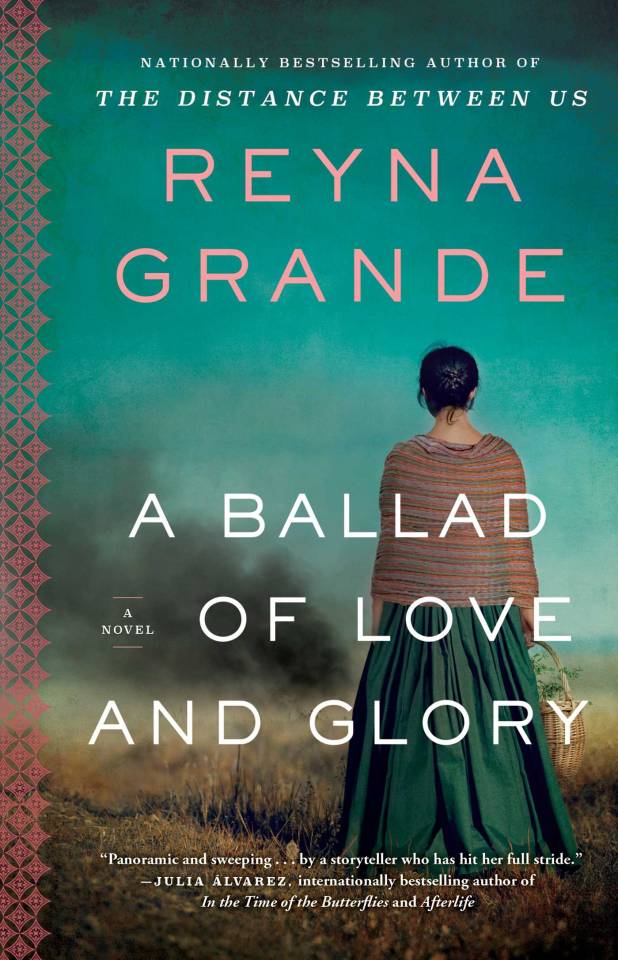
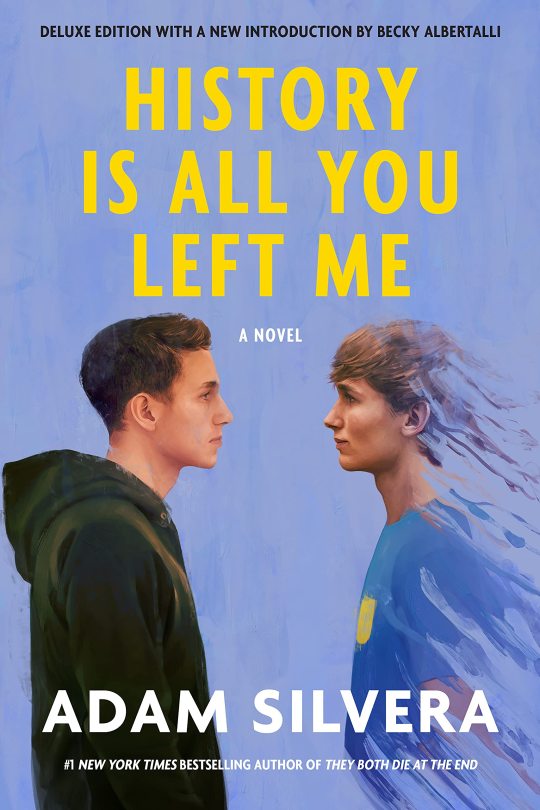
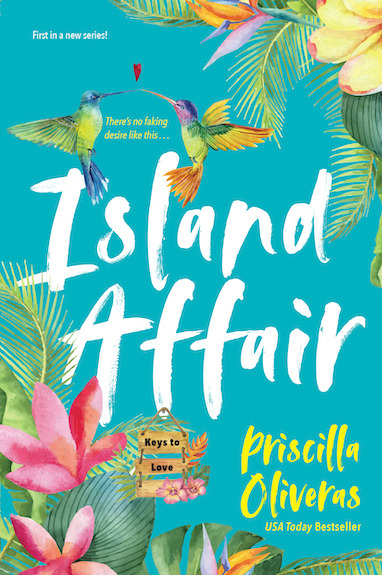

Libby Spotlight: Romance eBook Picks for Hispanic Heritage Month
A Ballad of Love and Glory by Reyna Grande
A forgotten war. An unforgettable romance.
The year is 1846. After the controversial annexation of Texas, the US Army marches south to provoke war with México over the disputed Río Grande boundary.
Ximena Salomé is a gifted Mexican healer who dreams of building a family with the man she loves on the coveted land she calls home. But when Texas Rangers storm her ranch and shoot her husband dead, her dreams are burned to ashes. Vowing to honor her husband’s memory and defend her country, Ximena uses her healing skills as an army nurse on the frontlines of the ravaging war.
Meanwhile, John Riley, an Irish immigrant in the Yankee army desperate to help his family escape the famine devastating his homeland, is sickened by the unjust war and the unspeakable atrocities against his countrymen by nativist officers. In a bold act of defiance, he swims across the Río Grande and joins the Mexican Army—a desertion punishable by execution. He forms the St. Patrick’s Battalion, a band of Irish soldiers willing to fight to the death for México’s freedom.
When Ximena and John meet, a dangerous attraction blooms between them. As the war intensifies, so does their passion. Swept up by forces with the power to change history, they fight not only for the fate of a nation but for their future together.
History is All You Left Me by Adam Silvera
When Griffin's first love and ex-boyfriend, Theo, dies in a drowning accident, his universe implodes. Even though Theo had moved to California for college and started seeing Jackson, Griffin never doubted Theo would come back to him when the time was right. But now, the future he's been imagining for himself has gone far off course.
To make things worse, the only person who truly understands his heartache is Jackson. But no matter how much they open up to each other, Griffin's downward spiral continues. He's losing himself in his obsessive compulsions and destructive choices, and the secrets he's been keeping are tearing him apart.
If Griffin is ever to rebuild his future, he must first confront his history, every last heartbreaking piece in the puzzle of his life.
Island Affair by Priscilla Oliveras
Sought-after social media influencer Sara Vance, in recovery from an eating disorder, is coming into her own, with a potential career expansion on the horizon. Despite the good news, her successful siblings (and their perfect spouses) have a way of making her feel like the odd one out. So, when her unreliable boyfriend is a no-show for a Florida family vacation, Sara recruits Luis Navarro—a firefighter paramedic and dive captain willing to play the part of her smitten fiancé . . .
Luis’s big Cuban familia has been in Key West for generations, and his quiet strength feeds off the island’s laidback style. Though guarded after a deep betrayal, he’ll always help someone in need—especially a spunky beauty with a surprising knowledge of Spanish curse words. Soon, he and Sara have memorized their “how we met” story and are immersed in family dinners, bike tours, private snorkeling trips . . . sharing secrets, and slow, melting kisses. But when it’s time for Sara to return home, will their fake relationship fade like the stunning sunset . . . or blossom into something beautiful?
This is the first volume of the "Keys to Love" series.
Island Beneath the Sea by Isabel Allende
Born a slave on the island of Saint-Domingue, Zarité - known as Tété - is the daughter of an African mother she never knew and one of the white sailors who brought her into bondage. Though her childhood is one of brutality and fear, Tété finds solace in the traditional rhythms of African drums and in the voodoo loas she discovers through her fellow slaves.
When twenty-year-old Toulouse Valmorain arrives on the island in 1770, it’s with powdered wigs in his baggage and dreams of financial success in his mind. But running his father’s plantation, Saint-Lazare, is neither glamorous nor easy. It will be eight years before he brings home a bride - but marriage, too, proves more difficult than he imagined. And Valmorain remains dependent on the services of his teenaged slave.
Spanning four decades, Island Beneath the Sea is the moving story of the intertwined lives of Tété and Valmorain, and of one woman’s determination to find love amid loss, to offer humanity though her own has been battered, and to forge her own identity in the cruellest of circumstances.
#hispanic heritage month#romance#fiction#ebooks#libby app#reading recommendations#reading recs#book recommendations#book recs#library books#tbr#tbr pile#to read#booklr#book tumblr#book blog#library blog#readers advisory
3 notes
·
View notes
Text
We’re not responsible for the mistakes of our forebears; we’re responsible for fixing them
Every country has skeletons in its closet that some people would rather not talk about. Canada is currently shaken by the discovery of hundreds of literal skeletons of children in residential schools that used brutal methods to “Christianize” and “Westernize” First Nations children. Shockingly, the last residential school was only closed in 1996!

In the United States, the history of slavery has been brought to the forefront with this year’s celebration of Juneteenth and the government’s decision to make it a national holiday.
World History Encyclopedia now increasingly covers Early Modern history, in particular the early history of the United States, as well as the Spanish and Portuguese Empires. Inevitably, we have published an increasing number of articles on the Transatlantic Slave Trade and the realities of slavery in the New World. Unfortunately, we’ve also seen an increase of negative comments on social media, particularly when talking about slavery.
It would appear that some people feel offended when they are reminded of the history of slavery. Some of our readers attempt to relativize, question and generally diminish the importance of slavery.
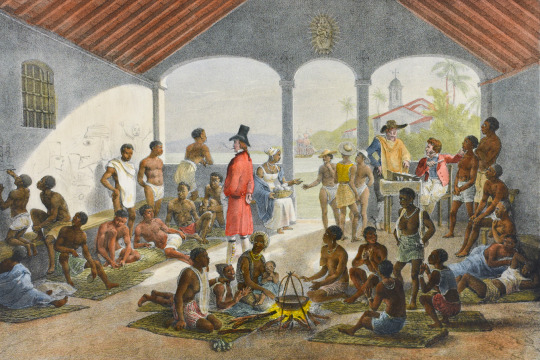
For example, we commonly read things along the lines of: “So many empires in history have used slaves, America is not unique!” I think we’ve all learnt in primary school that someone else’s wrongdoing does not justify our own. “But what about the Chinese and Irish, they were mistreated, too?” Of course they were mistreated, and recognizing slavery does not mean we cannot recognize other people’s plight, too. “African kingdoms provided the slaves, the Europeans didn’t steal them!” That’s absolutely true, yet when we talk about human trafficking today, we consider the buyers to be just as guilty as the sellers.
Why is it that to some of our readers the horrors of slavery appear so offensive to their identity? Why would anyone want to minimize the impact of slavery? Let’s be fair, this is not a uniquely American phenomenon: Many Turks get enraged by mentioning the Armenian Genocide and French President Macron faced protests for recognizing (not apologizing) that France’s involvement in Algeria was problematic. All over the world there are people who see history as a threat to their nation… usually the same people who also like to use history to aggrandize their nation’s accomplishments.
I am surprised by this: Growing up in Germany, I have experienced how a horrific period in the past can resonate in the collective consciousness. However, I’ve never seen this horrible past as a stain on my personal or national identity, or something to hide. Quite the opposite, Germany has taken the horrors of Nazism, vowed to work globally to stop them from ever occurring again, and created a new and even more powerful national identity as “the good guys of Europe.”
Some US commentators want us to believe that the recognition of current racial inequalities being caused by slavery is somehow anti-American. Others say: “My family had nothing to do with slavery, why should I feel responsible?” It is entirely true that we are not responsible for the mistakes our ancestors made. That does not mean we should ignore them, though.
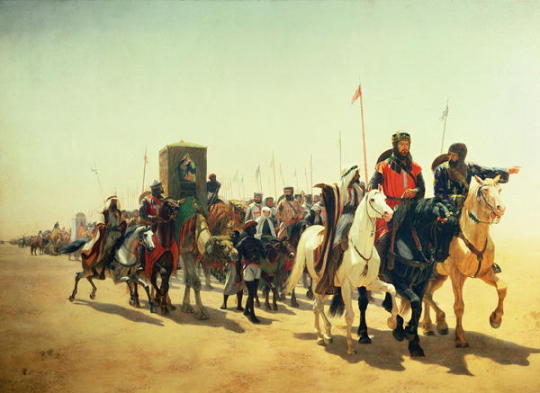
For that same reason, we should also not hold historical grudges. I’ve personally talked to Middle Easterners who refer back to the crusades to justify their critique of the West, and Quebecers who hate Anglo-Canadians for the oppression of French culture in Canada’s history. The people alive today are not responsible for past atrocities, so why hold a grudge? We can do better.
All of us alive today are responsible for learning from history and working together to fix the mistakes of the past that still reverberate in the cultural, economic and political landscapes of the present. The true power of history is revealed when we use it to understand the current situation and apply these learnings to build a better future. That means facing historical horrors with honesty, examining how they still affect us today, and acting upon them constructively and with mutual respect.
Jan van der Crabben
CEO, World History Encyclopedia
#slavery#history#world history#World History Encyclopedia#race#critical race theory#crt#residential schools#canadian history#us history#history of slavery#transatlantic slave trade
332 notes
·
View notes
Text
Dawn Station - Pilot
Basic summary: Video game developer Jack Mcloughlin is finally releasing a new game after a ten year hiatus.
Content warnings: Murder, dismemberment, body horror
It comes as a shock to everyone, including you, when Jack Mcloughlin announces the release of a new game at the start of the second week of October.
There are several reasons why this is such a big deal. One: Jack Mcloughlin has been making games since he was twenty seven, and has released only five of them in the thirty years he's been doing it. Two: Jack Mcloughlin is world renowned for his fantastic horror games, all done in wildly different styles, but still notably his own. Three: Jack Mcloughlin has not, up til now, so much as mentioned working on a new game. The only social media site he's fully active on is Twitter - which you check regularly for any updates - and before the release of his last game, Ehrmann Lab, he had left a series of cryptic clues for two months leading up to the announcement. Those had been probably the most fun two months you'd ever had in your life, and even helped you make new friends. But this time around, there is no warning. The trailer is dropped at Purina Expo, one of the biggest American gaming conventions of the year. You were incredibly lucky to be able to snag tickets. Usually, this convention is where the hottest games that would be coming out the following year would be announced, trailers would be played, and developers would discuss - so everyone there on October 10th is shocked to not only be the first to see the trailer, but to hear from the man himself. Jack Mcloughlin takes the stage, gleefully announcing the release of Dawn Station on October 31st this year.
Now, the release of a new game from Septic Games - Mcloughlin's own software company, which he founded after his second game's release - is a big enough deal. But this… this is something else. Mcloughlin explains it before the reveal of the trailer, and you listen with great excitement.
"Dawn Station," says the man, practically bouncing across the stage with glee and shouting into his mic with a hoarse Irish accent. "is a feat of modern gaming. Now, I understand that when you play games, it can get boring to replay them later on after you've finished, because - well, you know how it goes! You know all the twists and turns, all the jumpscares, all the fights, all the spooks. But what if I told you that there was a way you could play where things were different each time?"
Behind the man, on a large screen, an image comes up. This is the first promo image for the new game to be shown to the people. The image is of a tilted hallway in what looks like a complex, broken down space station, overgrown with unusual plants that glow and spark. In the centre of the image is an astronaut. His helmet is on the floor, blood soaked. His face is half in shadow. All that can be seen is curly olive hair and neon green eyes - two on his face, and one embedded in his neck. The suit itself is torn, ripped open with a mouth and a dripping tongue where the being's stomach should be. A torch is on the ground behind him, attempting to cast light on the room. The words "Dawn Station" come up in solid, bright green font next to the being's face.
"This is Dawn Station!" cries the developer, over the many excited murmurs of the crowd. "The first ever virtual reality game with a fully developed artificial intelligence antagonist! An antagonist who learns from the players movements and choices, who grows and changes based off of what you do. You control the game, now more than ever! He's clever, he's learning, he knows where you are, and his objective is to kill the player - introducing... Alien X, otherwise known as… the Anti!"
Everyone cheers. Mcloughlin steps aside, a beam splitting his pale face, and allows the room to darken, and the trailer to play.
You're in awe. The trailer shows that you play as a character named Drew Oliver, an astronaut in their mid twenties who's aboard the Dawn Space Station, which has fallen to the planet you seemed to have been monitoring - the Othohiri 5RM. The game seems to revolve around attempting to explore the little bits of the planet that you can while repairing the ship and dealing with your descent into madness, all the while being chased down by the Alien X, a shapeshifting monstrosity who's eager to end your life before you can finish your goals. After watching it… well, everyone is absolutely blown away, especially you. This is unlike anything Mcloughlin had ever produced, especially to this scale. It's no wonder he hadn't produced a game in ten years if this was what he had been working on. You're practically vibrating with excitement at the breathtakingly beautiful scenery and realistic yet perfectly stylistic graphics, and the 8D sound design that seems to echo from all around you. It's incredible. The second you get back to your hotel room that night, you're one of the first to preorder the game.
Your week at the convention ends, and you go back home, counting down the days to the game's release. However, even more exciting things are happening. On Twitter, a few of your favourite youtubers are acting rather cryptic. KrisDoesGAMEZ and rrroadblock, two streamers you like, retweet Mcloughlin's announcement tweet with eye emojis and promises of the game being good. DUSSST, visualthursday and BroAverage make their own posts about it. PeachCheerio and TheSkinnerr upload short update videos promising exciting things to come.
On October 15th, it happens - ten youtubers each upload an early access demo of Dawn Station, having been chosen and given the code to play it by Mcloughlin himself. You don't watch the videos because you want to play the game yourself with no spoilers, but from what you've seen, it's fucking amazing. Critics are already calling it the game of the decade. The internet is thriving, and a few people have already cosplayed Drew, the main character. Your best friend uploads a joking cosplay of the Anti and walks around town with it on. He gets over a thousand likes and teases you about being too good for you now that he's internet famous. You're living for all of this.
On October 16th, youtuber PeachCheerio is murdered in his own home.
Everyone is shocked, rightfully. Here is a man who had streamed just the day before, chatting with his members and looking at Dawn Station memes on Twitch. Today, he was discovered by his girlfriend in his own home. Leaked police reports tell you that the man, whose real name was Ronald Murphy, had been messily dismembered, his organs removed, half of them missing. You're in shock. He was one of your favourite streamers, and maybe it's silly to mourn someone you've never met, but you're deeply, deeply saddened by the news.
However, it doesn't stop there. The very next day, youtuber DUSSST - or Louise Greendale - is found the same way Ronald had been. Louise's girlfriend apparently called the police in hysterics before panic tweeting about the incident. The posts were taken down an hour later. The screenshots of what she'd said trend of Twitter and Tumblr anyway.
This is when the conspiracy theories arrive. Two youtubers dead in two days, both brutally taken apart and missing organs? Some people mock the theorists for it. Who had even said Louise had been killed the same way as Ronald, anyway? That is, until more apparent police reports are leaked revealing the details of Louise's death. The internet goes wild. The Los Angeles police department posts a video begging whoever's causing the leaks to stop, to think about the families of the deceased. All this does is prove that they're true. This video, too, is later taken down.
You log off in disgust. Some people have no fucking shame.
Things heat up the next day, on October 18th, when user rrroadblock, or Aryan Jha, dies as well. The death is covered up for the first few hours afterwards, but eventually is leaked in the same manner as the last two murders. This time, the theorists are no longer labeled as crazy. In fact, everyone's getting in on this mystery now. Three popular youtubers dead now, each found in bloody states in their own homes, three days apart? No one knows what's happening, but that doesn't stop people from guessing. And while you refuse to involve yourself in any of this, you also find yourself wondering who or what - not what, of course it's not a what, that's just ridiculous - who is killing all of these people.
Day four. The internet is silent, waiting. And yes, sure enough, youtuber KrisDoesGAMEZ, or Kris Velvet, is dead.
This time, someone realizes something that makes everyone pause. Each of the dead youtubers are all the ones who were given the free demo of Dawn Station, and are even dying in the order that they played it in. Everyone goes insane. Even you're suspicious - of what, exactly, you don't know, because why would someone murder someone else so brutally over a video game? Despite that, this can't be a coincidence. People place bets on whether youtuber ducksontheroof, or Donna Campbell, is going to be the next one to be found dead. Donna herself makes a statement on her Instagram, expressing disgust at all the people who were spreading such information around. She then deactivated all her socials apart from her YouTube. The people who had been making bets were shamed, and you have to log off yet again. This is getting to be too much.
You stay offline until nearly four pm the next day. Your friend calls you up to give you the news, but you already know what they're going to say. Let me guess, you start, voice flat and tired. Donna Campbell's dead.
They confirm it. You don't know what to say.
Her family put out a statement asking people not to theorize about her death. People do it anyway. Reports state that the remaining five youtubers who had played Dawn Station, along with, surprisingly, Jack Mcloughlin himself, had been taken into police custody. For protection, you assume. Once again, the internet goes insane. This proves their theories about the game connecting all the deaths, and a silent dread and buzz of twisted excitement hangs over everyone. You're just disgusted. People are treating this like some kind of murder mystery game, like this isn't real, actual lives.
Two days pass without news. At the end of the second day, there's yet another leak. Youtubers Doomandgloom - Persephone Henry - and TheSkinnerr - Rodney Pratt - are dead. You're just numb. You're just so fucking numb.
This reveal, of course, inspires yet another debate. If the youtubers had been under police protection, how had they died? Had the police seen anything? Why hadn't the leak said anything about it? Who was killing all these people in so little time, how hadn't they been caught? Had, really, no one seen anything at all?
There are now three youtubers left who'd played the game. Hothothotstanley, or Stanley McIver, visualthursday, or Khia Herrera, and BroAverage, or Chase Brody. You met Stanley McIver, once, at a convention in London three years ago. You have a picture on your memory board of you standing in the convention hall, him with his arm around your shoulder, you with a grin and sparkle in your eye. You can see the picture from your bed. You turn away from it.
However, the next day is a surprise to everyone. A video is uploaded to someone's Twitter - a full, uncensored video of the murder of Stanley McIver inside the government safe house he and the others had seemingly been kept in. The video is immediately taken down and the Twitter deleted, but everyone has seen it. Including you. The video is… horrifying. Of course it is. Why did you watch it? But you do manage to see who it is that killed him. Everyone on the internet does. And this - this video, that's maybe five minutes long - is enough to make everyone go silent.
The killer looks exactly like the Anti from Dawn Station.
No one knows quite what to make of this.
Even less so when Jack Mcloughlin dies the next day.
He's murdered. Same way as all the rest of them, in police custody. Now this is enough to shock everyone into mourning silence. Only a few pricks are left, and their accounts, channels and blogs are swiftly deactivated. Nine deaths in nine days. Nine deaths. Nine. Jack Mcloughlin.
The next day, Khia Herrera - well, you know.
Chase Brody is the last one left alive. You never watched his channel that much - he's really into horror, and is known for his Walking Dead playthrough and his Undertale Genocide run - but you still already feel a strange sense of loss. A sort of emptiness. Something churns in your stomach that you don't understand. There's a lot that you don't understand.
The release of Dawn Station is cancelled.
You spend the night at a friend's house, and just bawl for hours. You shouldn't be so upset, you shouldn't! You never knew any of these people! But fuck, there's something about seeing all these people who you'd been watching online for so long, who have given you so many happy days, so many laughs and inside jokes… just die. How had this happened? Who was it who was doing this?
Your friend sadly suggests it's some sick Jack Mcloughlin hater who decided it'd be fun to cosplay as his newest character and kill people to scare everyone. But while you outwardly agree, you internally know it's not true. Because every time you watch that video, every time you watch Stanley die - and you watch it a lot, just trying to make yourself feel something, even if it's just sick - you can tell the person isn't human. You know that's ridiculous, of course. But there's something about its eyes. Its face. It glances up at the camera and makes eye contact, and grins with too many white, jagged teeth, like an anglerfish. The eye in its throat sees you too. It glows. You shudder every time, watching it shake with glitches and laughter.
You're scared. You feel sick and dizzy and you lock your doors out of fear. You stay inside and open Tumblr, Twitter and Instagram again.
Poor Chase Brody, says the internet. They're already mourning. Already accepted his death. Poor, poor Chase Brody.
You hope he's ok, wherever he is.
35 notes
·
View notes
Link
“White people are terrible,” “I have white privilege,” and “most of the world’s problems are caused by white people” are three general statements countless social justice warriors and their enablers agree with. Yet they are all based on the severest distortion of reality. You or I should no more apologize for being white than an African-American should for being black.
Just as many blacks, Hispanics, and other minorities are made more pliable by the media and the establishment by being told they are eternal victims, white people are made more pliable by agreeing that they need to always feel guilty. Using an SJW “anti-racism” that feels awfully like the leftist version of a Nazi book about hereditary, white people supposedly inherit the evil deeds of dead dudes who owned slaves prior to the Civil War or arrived on a foreign continent in a year like 1492 or 1788.
The establishment-enforced guilt is even greater for those directly descended from such people, but even culturally and genetically unrelated individuals like Polish- and Italian-Americans, whose ancestors pretty much all arrived after periods like the slavery era, are held accountable, too. Why? Even if we ridiculously assumed we can find descendants “guilty” of their ancestry, the white guilt thesis is like putting all of Harlem’s young black men in 2016 under house arrest because 20 of them were involved in a vicious street brawl… in 1937.
Provided you adhere to our creed, neomasculinity and the Return Of Kings community form the broadest functional church you will find. We do not care where you come from, so long as you support our goal of a return to masculine societies that emphasize community-building and do not apologize for taking pride in their own cultures. ROK readers who are black, white, Asian or something else are all equal in this regard.
Here are just three of many reasons why I will not hate or feel guilty about my skin tone.
1. I’m the descendant of victims myself because many of my ancestors were from oppressed ethnic and religious groups
Look at those privileged starving Irish!
Are you heavily Irish-blooded, like me? Italian? Polish? Ukrainian? Were your ancestors Catholics living in heavily Protestant areas, or perhaps Huguenots who had to flee persecutory France?
It’s funny how SJWs prance on about white privilege when over half of all whites who emigrated to America, Canada or Australia, from the Puritans to Yugoslavian Civil War refugees, came because the civilian government or monarchy representing another ethnicity or religion essentially chased them out, had killed their family members, or wanted them dead, too. Many of the white groups who did take the journey, particularly the Italians or Irish, were then subjected to quotas and mistreatment in places like New York for years.
A great deal of my ancestors were Catholics in Prussia and other Protestant parts of northern Germany. This section of my family tree is replete with persecutions, including one great-great-great-great grandfather who lost sight in one eye and movement in his arm after being brutally assaulted by a Prussian policeman. His crime? Being an ethnic German leaving a Catholic church on Sunday in the 1800s. Catholic churches were only for “subhuman” Poles. Catholic Prussians were seen as traitors who belonged in Bavaria, prison, or dead. He ended up eking out an existence as a tailor with one good arm, after both he and his brother were repeatedly refused admission to the civil service for their faith.
In addition, I had Irish immigrant forebears whose fathers, mothers, brothers, and sisters died as a result of the Potato Famine. One of these ancestors, the eldest child in his family, was working in Dublin to make money for the family when, in the space of three months, he received news that his parents, all his sisters, and all but one of his brothers had died from starvation, malnutrition, or diseases related to them.
When my aunt did the genealogy over three years, she counted 37 family members in one corner of an Irish county who died from starvation or starvation-related illness in 13 months. The famine was predicted and even aggravated by the British. Considering the squalor into which the occupiers had driven the Irish Catholics, the whole ordeal was fundamentally caused by them, too. With only an extra mouth to feed, this great-great-great grandfather of mine took his barely school-aged brother with him to Australia two months later. What role did these two have in oppressing others, white or non-white, that I should feel shame about today?
Look further back into my family tree and you find German, Dutch and Swiss Jews, many of whom were shunted around various locations within Europe, depending on what limited patience local authorities had for yarmulke-wearers at the time.
With this lineage, what exactly do I have to apologize for, aside from my supposedly very, very privileged, at best lower middle-class English forebears from drab West London and grim Yorkshire? Most of them never saw a dark person, let alone mistreated one. To boot, the vast majority lived poor, thankless lives without clean sanitation, abundant food, or anything close to job security. And these are the stations in life, through no fault of their own, that 95% of your ancestors reached as well.
2. Minorities and other non-whites frequently treated and still treat each other far worse than white people did
Rwandan genocide, anyone?
From the pre-Columbian Central and South American peoples to the Rwandan genocide, non-whites have very often treated one another even more abysmally than whites have treated them. European technology may have amplified the number of indigenous and other deaths in places like the Americas, but raw hatred, aggression, and the continuity of violence can be found in even greater quantities in non-white historical squabbles.
Europeans have also been incorrectly blamed for things like infectious diseases, despite the scientific work of antiseptic procedure pioneer Ignaz Semmelweiss being years, sometimes even centuries away. Meanwhile, non-whites have been allowed to kill non-whites without serious condemnation from SJWs.
For example, critics of the Iraq War and the attempted rebuilding of post-Saddam Iraq have said that the whole country is based on a fiction that dates back to the European post-World War I mandate systems. In other words, if Kurds, Shia Arabs, and Sunni Arabs inhabit the same country, they kill each other! Whilst it is appetizing for SJWs to blame the big, bad British and French for this, it is far from the truth. Kurds and Arabs have been butchering each other for countless centuries. The greatest Muslim figure of all the Crusades, Saladin, was consistently mistrusted because of his Kurdish origins. Similarly, intra-Arab or Arab-Iranian Sunni-Shia violence is age-old and has little if anything to do with Europeans.
Last year, Rock Thompson wrote a superb piece about the hypocrisy of attacking Columbus Day in the Americas. His work exposed the double standards of many Native American and also Central and South American tribes, who pretend their ancestors were routinely peaceful when, in fact, they regularly engaged in deplorable acts of gratuitous violence, including human sacrifices and the sadistic mutilation of enemies who were not so ethnically different. The conquistadors and Puritans are falsely seen as the harbingers of cultural and racial genocide in the Americas. Local indigenous tribes, however, were already hunting each other down for sport well before the tall ships arrived.
3. White-majority countries make the humanitarian world go round
A tent city the Saudis refused to make available for fellow Arab Syrian refugees.
Whenever you find an aid program for starving Africans, war-torn Arabs, or other suffering people, chances are that a number of white Westerners are behind it. Even if they’re not all white, they invariably come from white-majority and/or white-founded Western countries, or are funded by them. All to assuage the guilt of white people living in 2016 who feel the need to apologize for a European colonial regime that replaced almost always far more brutal indigenous ones.
Western countries also welcome non-whites in droves, both as immigrants and as “refugees.” The recent Syrian crisis is a testament to this (over-)generosity. While Saudi Arabia refused to accommodate fellow Arab Syrians in their already-constructed tent city, used normally for the Haj Priligrimage, Germany and other European states bore the brunt of those fleeing, including through the open door policies of leaders like Angela Merkel.
In general terms, white people care more about the developmental outcomes of non-whites. Wealthy non-white countries like Japan and Korea have perfected a system of meticulously keeping their populations pure and rejecting the asylum claims of over 99% of claimed refugees. This asymmetrical state of affairs is ironic when Japan’s own history of colonisation, notably the Rape of Nanking, is taken into consideration.
White guilt is also very profitable for certain establishment figures and zealous entertainers. It’s why twats like Bono and Bob Geldof get up every morning, after all. And, far from sucking the world dry, white folks have repeatedly tried to make it better. Very often this generosity is taken to an extreme, but the point of white-majority countries acting and non-white countries stalling or ignoring remains valid.
1 note
·
View note
Text
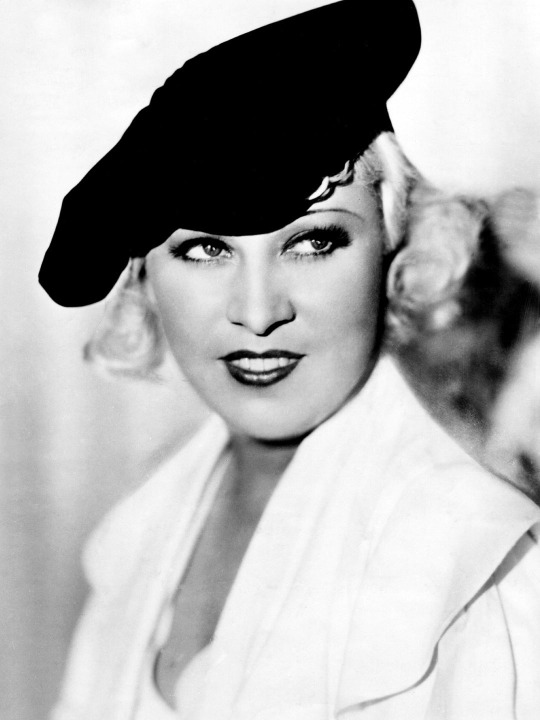
Mae West (born Mary Jane West; August 17, 1893 – November 22, 1980) was an American actress, singer, playwright, screenwriter, comedian and sex symbol whose entertainment career spanned seven decades. She was known for her lighthearted, bawdy double entendres and breezy sexual independence, and often used a husky contralto voice. She was active in vaudeville and on stage in New York City before moving to Los Angeles to pursue a career in the film industry.
West was one of the most controversial movie stars of her day; she encountered many problems, especially censorship. She once quipped, "I believe in censorship. I made a fortune out of it." She bucked the system by making comedy out of conventional mores, and the Depression-era audience admired her for it. When her film career ended, she wrote books and plays, and continued to perform in Las Vegas and the United Kingdom, on radio and television, and recorded rock 'n roll albums. In 1999, the American Film Institute posthumously voted West the 15th greatest female screen legend of classic American cinema.
Mary Jane West was born on August 17, 1893, in Brooklyn (either Greenpoint or Bushwick, before New York City was consolidated in 1898). She was delivered at home by an aunt who was a midwife. She was the eldest surviving child of John Patrick West and Mathilde "Tillie" (later Matilda) Delker (originally Doelger; later Americanized to "Delker" or "Dilker"). Tillie and her five siblings emigrated with their parents, Jakob (1835–1902) and Christiana (1838–1901; née Brüning) Doelger from Bavaria in 1886. West's parents married on January 18, 1889, in Brooklyn, to the pleasure of the groom's parents and the displeasure of the bride's parents and raised their children as Protestants, although John West was of mixed Catholic–Protestant descent.
West's father was a prizefighter known as "Battlin' Jack West" who later worked as a "special policeman" and later had his own private investigations agency. Her mother was a former corset and fashion model. Her paternal grandmother, Mary Jane (née Copley), for whom she was named, was of Irish Catholic descent and West's paternal grandfather, John Edwin West, was of English–Scots descent and a ship's rigger.
Her eldest sibling, Katie, died in infancy. Her other siblings were Mildred Katherine West, later known as Beverly (December 8, 1898 – March 12, 1982), and John Edwin West II (sometimes inaccurately called "John Edwin West, Jr."; February 11, 1900 – October 12, 1964). During her childhood, West's family moved to various parts of Woodhaven, as well as the Williamsburg and Greenpoint neighborhoods of Brooklyn. In Woodhaven, at Neir's Social Hall (which opened in 1829 and is still extant), West supposedly first performed professionally.
West was five when she first entertained a crowd at a church social, and she started appearing in amateur shows at the age of seven. She often won prizes at local talent contests. She began performing professionally in vaudeville in the Hal Clarendon Stock Company in 1907 at the age of 14. West first performed under the stage name "Baby Mae", and tried various personas, including a male impersonator.
She used the alias "Jane Mast" early in her career. Her trademark walk was said to have been inspired or influenced by female impersonators Bert Savoy and Julian Eltinge, who were famous during the Pansy Craze. Her first appearance in a Broadway show was in a 1911 revue A La Broadway put on by her former dancing teacher, Ned Wayburn. The show folded after eight performances, but at age 18, West was singled out and discovered by The New York Times. The Times reviewer wrote that a "girl named Mae West, hitherto unknown, pleased by her grotesquerie and snappy way of singing and dancing". West next appeared in a show called Vera Violetta, whose cast featured Al Jolson. In 1912, she appeared in the opening performance of A Winsome Widow as a "baby vamp" named La Petite Daffy.
She was encouraged as a performer by her mother, who, according to West, always thought that anything Mae did was fantastic. Other family members were less encouraging, including an aunt and her paternal grandmother. They are all reported as having disapproved of her career and her choices. In 1918, after exiting several high-profile revues, West finally got her break in the Shubert Brothers revue Sometime, opposite Ed Wynn. Her character Mayme danced the shimmy and her photograph appeared on an edition of the sheet music for the popular number "Ev'rybody Shimmies Now".
Eventually, she began writing her own risqué plays using the pen name Jane Mast. Her first starring role on Broadway was in a 1926 play she entitled Sex, which she wrote, produced, and directed. Although conservative critics panned the show, ticket sales were strong. The production did not go over well with city officials, who had received complaints from some religious groups, and the theater was raided, with West arrested along with the cast. She was taken to the Jefferson Market Court House, (now Jefferson Market Library), where she was prosecuted on morals charges, and on April 19, 1927, was sentenced to 10 days for "corrupting the morals of youth". Though West could have paid a fine and been let off, she chose the jail sentence for the publicity it would garner. While incarcerated on Welfare Island (now known as Roosevelt Island), she dined with the warden and his wife; she told reporters that she had worn her silk panties while serving time, in lieu of the "burlap" the other girls had to wear. West got great mileage from this jail stint. She served eight days with two days off for "good behavior". Media attention surrounding the incident enhanced her career, by crowning her the darling "bad girl" who "had climbed the ladder of success wrong by wrong".
Her next play, The Drag, dealt with homosexuality, and was what West called one of her "comedy-dramas of life". After a series of try-outs in Connecticut and New Jersey, West announced she would open the play in New York. However, The Drag never opened on Broadway due to efforts by the New York Society for the Suppression of Vice to ban any attempt by West to stage it. West explained, "The city fathers begged me not to bring the show to New York because they were not equipped to handle the commotion it would cause." West was an early supporter of the women's liberation movement, but said she was not a "burn your bra" type feminist. Since the 1920s, she was also an early supporter of gay rights, and publicly declared against police brutality that gay men experienced. She adopted a then "modern" psychological explanation that gay men were women's souls in men's bodies, and hitting a gay man was akin to hitting a woman. In her 1959 autobiography, Goodness Had Nothing to Do With It, West strongly objected to hypocrisy while, for surprising and unexplained reasons, also disparaging homosexuality: "In many ways homosexuality is a danger to the entire social system of Western civilization. Certainly a nation should be made aware of its presence — without moral mottoes — and its effects on children recruited to it in their innocence. I had no objection to it as a cult of jaded inverts... involved only with themselves. It was its secret, anti-social aspects I wanted to bring into the sun. As a private pressure group it could, and has, infected whole nations." This perspective, never elaborated upon by Mae West in other books or interviews seems inconsistent with the Mae West persona. In her 1975 book Sex, Health, and ESP, Mae West writes on page 43, "I believe that the world owes male and female homosexuals more understanding than we've given them. Live and let live is my philosophy on the subject, and I believe everybody has the right to do his or her own thing or somebody else's -- as long as they do it all in private!"
West continued to write plays, including The Wicked Age, Pleasure Man and The Constant Sinner. Her productions aroused controversy, which ensured that she stayed in the news, which also often resulted in packed houses at her performances. Her 1928 play, Diamond Lil, about a racy, easygoing, and ultimately very smart lady of the 1890s, became a Broadway hit and cemented West's image in the public's eye. This show had an enduring popularity and West successfully revived it many times throughout the course of her career. With Diamond Lil being a hit show, Hollywood naturally came courting.
In 1932, West was offered a contract by Paramount Pictures despite being close to 40. This was an unusually late age to begin a film career, especially for women, but she was not playing an ingénue. She nonetheless managed to keep her age ambiguous for some time. She made her film debut in Night After Night (1932) starring George Raft, who suggested West for the role. At first she did not like her small role in Night After Night, but was appeased when she was allowed to rewrite her scenes.[45] In West's first scene, a hat-check girl exclaims, "Goodness, what beautiful diamonds", and West replies, "Goodness had nothing to do with it, dearie." Reflecting on the overall result of her rewritten scenes, Raft is said to have remarked, "She stole everything but the cameras."
She brought her Diamond Lil character, now renamed "Lady Lou", to the screen in She Done Him Wrong (1933). The film was one of Cary Grant's first major roles, which boosted his career. West claimed she spotted Grant at the studio and insisted that he be cast as the male lead. She claimed to have told a Paramount director, "If he can talk, I'll take him!". The film was a box office hit and earned an Academy Award nomination for Best Picture. The success of the film saved Paramount from bankruptcy, grossing over $2 million, the equivalent of $140 million today. Paramount recognizes that debt of gratitude today, with a building on the lot named after West.
Her next release, I'm No Angel (1933), teamed her with Grant again. I'm No Angel was also a box office hit and was the most successful of her entire film career. In the months that followed the release of this film, reference to West could be found almost anywhere, from the song lyrics of Cole Porter, to a Works Progress Administration (WPA) mural of San Francisco's newly built Coit Tower, to She Done Him Right, a Betty Boop cartoon, to "My Dress Hangs There", a painting by Mexican artist Frida Kahlo. Kahlo's husband, Diego Rivera, paid his own tribute: "West is the most wonderful machine for living I have ever known – unfortunately on the screen only." To F. Scott Fitzgerald, West was especially unique: "The only Hollywood actress with both an ironic edge and a comic spark." As Variety put it, "Mae West's films have made her the biggest conversation-provoker, free-space grabber, and all-around box office bet in the country. She's as hot an issue as Hitler."
By 1933, West was one of the largest box office draws in the United States and, by 1935, West was also the highest paid woman and the second-highest paid person in the United States (after William Randolph Hearst). Hearst invited West to San Simeon, California. "I could'a married him", West explained, "but I got no time for parties. I don't like those big crowds." On July 1, 1934, the censorship of the film Production Code began to be seriously and meticulously enforced, and West's scripts were heavily edited. She would intentionally place extremely risqué lines in her scripts, knowing they would be cut by the censors. She hoped they would then not object as much to her other less suggestive lines. Her next film was Belle of the Nineties (1934). The original title, It Ain't No Sin, was changed due to the censors' objections. Despite Paramount's early objections regarding costs, West insisted the studio to hire Duke Ellington and his orchestra to accompany her in the film's musical numbers. Their collaboration was a success; the classic "My Old Flame" (recorded by Duke Ellington) was introduced in this film. Her next film, Goin' to Town (1935), received mixed reviews, as censorship continued to take its toll in eroding West's best lines.
Her following effort, Klondike Annie (1936) dealt, as best it could given the heavy censorship, with religion and hypocrisy. Some critics called the film her magnum opus, but not everyone felt the same way. Press baron and film mogul William Randolph Hearst, ostensibly offended by an off-handed remark West made about his mistress, Marion Davies, sent a private memo to all his editors stating, "That Mae West picture Klondike Annie is a filthy picture... We should have editorials roasting that picture, Mae West, and Paramount... DO NOT ACCEPT ANY ADVERTISING OF THIS PICTURE." At one point, Hearst asked aloud, "Isn't it time Congress did something about the Mae West menace?" Paramount executives felt they had to tone down the West characterization or face further recrimination. This may be surprising by today's standards, as West's films contained no nudity, no profanity, and very little violence. Though raised in an era when women held second-place roles in society, West portrayed confident women who were not afraid to use their sexual wiles to get what they wanted. "I was the first liberated woman, you know. No guy was going to get the best of me. That's what I wrote all my scripts about."
Around the same time, West played opposite Randolph Scott in Go West, Young Man (1936). In this film, she adapted Lawrence Riley's Broadway hit Personal Appearance into a screenplay. Directed by Henry Hathaway, Go West, Young Man is considered one of West's weaker films of the era, due to the censor's cuts.
West next starred in Every Day's a Holiday (1937) for Paramount before their association came to an end. Again, due to censor cuts, the film performed below its goal. Censorship had made West's sexually suggestive brand of humor impossible for the studios to distribute. West, along with other stellar performers, was put on a list of actors called "Box Office Poison" by Harry Brandt on behalf of the Independent Theatre Owners Association. Others on the list were Greta Garbo, Joan Crawford, Marlene Dietrich, Fred Astaire, Dolores del Río, Katharine Hepburn and Kay Francis. The attack was published as a paid advertisement in The Hollywood Reporter, and was taken seriously by the fearful studio executives. The association argued that these stars' high salaries and extreme public popularity did not affect their ticket sales, thus hurt the exhibitors. This did not stop producer David O. Selznick, who next offered West the role of the sage madam, Belle Watling, the only woman ever to truly understand Rhett Butler, in Gone with the Wind, after Tallulah Bankhead turned him down. West also turned down the part, claiming that as it was, it was too small for an established star, and that she would need to rewrite her lines to suit her own persona. The role eventually went to Ona Munson.
In 1939, Universal Studios approached West to star in a film opposite W. C. Fields. The studio was eager to duplicate the success of Destry Rides Again starring Marlene Dietrich and James Stewart, with a comic vehicle starring West and Fields. Having left Paramount 18 months earlier and looking for a new film, West accepted the role of Flower Belle Lee in the film My Little Chickadee (1940). Despite the stars' intense mutual dislike, Fields's very real drinking problems and fights over the screenplay, My Little Chickadee was a box office hit, outgrossing Fields's previous film, You Can't Cheat an Honest Man (1939) and the later The Bank Dick (1940). Despite this, religious leaders condemned West as a negative role model, taking offense at lines such as "Between two evils, I like to pick the one I haven't tried before" and "Is that a gun in your pocket, or are you just glad to see me?"
West's next film was Columbia's The Heat's On (1943). She initially did not want to do the film, but after actor, director and friend Gregory Ratoff (producer Max Fabian in All About Eve) pleaded with her and claimed he would go bankrupt if she could not help, West relented as a personal favor. Censors by now, though, had curtailed the sexual burlesque of the West characterization. The studio had orders to raise the neck lines and clean up the double entendres. This was the only film for which West was virtually not allowed to write her own dialogue and, as a result, the film suffered.
Perhaps the most critical challenge facing West in her career was censorship of her dialogue. As on Broadway a decade before, by the mid-1930s, her risqué and ribald dialogue could no longer be allowed to pass. The Heat's On opened to poor reviews and weak performance at the box office. West was so distraught after the experience and by her years of struggling with the strict Hays censorship office, that she would not attempt another film role for the next quarter-century. Instead, West pursued a successful and record-breaking career in top nightclubs, Las Vegas, nationally in theater and on Broadway, where she was allowed, even welcomed, to be herself.
After appearing in The Heat's On in 1943, West returned to a very active career on stage and in swank clubs. Among her popular new stage performances was the title role in Catherine Was Great (1944) on Broadway, in which she penned a spoof on the story of Catherine the Great of Russia, surrounding herself with an "imperial guard" of tall, muscular young actors. The play was produced by theater and film impresario Mike Todd (Around The World in 80 Days) and ran for 191 performances and then went on tour.
When Mae West revived her 1928 play Diamond Lil, bringing it back to Broadway in 1949, The New York Times labeled her an "American Institution – as beloved and indestructible as Donald Duck. Like Chinatown, and Grant's Tomb, Mae West should be seen at least once." In the 1950s, West starred in her own Las Vegas stage show at the newly opened Sahara Hotel, singing while surrounded by bodybuilders. The show stood Las Vegas on its head. "Men come to see me, but I also give the women something to see: wall to wall men!" West explained. Jayne Mansfield met and later married one of West's muscle men, a former Mr. Universe, Mickey Hargitay.
When casting about for the role of Norma Desmond for the 1950 film Sunset Boulevard, Billy Wilder offered West the role. Still smarting from the censorship debacle of The Heat's On, and the constraints placed on her characterization, she declined. The theme of the Wilder film, she noted, was pure pathos, while her brand of comedy was always "about uplifting the audience". Mae West had a unique comic character that was timeless, in the same way Charlie Chaplin did. After Mary Pickford also declined the role, Gloria Swanson was cast.
In subsequent years, West was offered the role of Vera Simpson, opposite Marlon Brando, in the 1957 film adaptation of Pal Joey, which she turned down, with the role going to Rita Hayworth. In 1964, West was offered a leading role in Roustabout, starring Elvis Presley. She turned the role down, and Barbara Stanwyck was cast in her place. West was also approached for roles in Frederico Fellini's Juliet of the Spirits and Satyricon, but rejected both offers.
In 1958, West appeared at the live televised Academy Awards and performed the song "Baby, It's Cold Outside" with Rock Hudson, which brought a standing ovation. In 1959, she released an autobiography, Goodness Had Nothing to Do With It, which became a best seller and was reprinted with a new chapter in 1970. West guest-starred on television, including The Dean Martin Show in 1959 and The Red Skelton Show in 1960, to promote her autobiography, and a lengthy interview on Person to Person with Charles Collingwood, which was censored by CBS in 1959, and never aired. CBS executives felt members of the television audience were not ready to see a nude marble statue of West, which rested on her piano. In 1964, she made a guest appearance on the sitcom Mister Ed. Much later, in 1976, she was interviewed by Dick Cavett and sang two songs on his "Back Lot U.S.A." special on CBS.
West's recording career started in the early 1930s with releases of her film songs on shellac 78 rpm records. Most of her film songs were released as 78s, as well as sheet music. In 1955, she recorded her first album, The Fabulous Mae West. In 1965, she recorded two songs, "Am I Too Young" and "He's Good For Me", for a 45 rpm record released by Plaza Records. She recorded several tongue-in-cheek songs, including "Santa, Come Up to See Me", on the album Wild Christmas, which was released in 1966 and reissued as Mae in December in 1980. Demonstrating her willingness to keep in touch with the contemporary scene, in 1966 she recorded Way Out West, the first of her two rock-and-roll albums. The second, released in 1972 on MGM Records and titled Great Balls of Fire, covered songs by The Doors, among others, and had songs written for West by English songwriter-producer Ian Whitcomb.
After a 27-year absence from motion pictures, West appeared as Leticia Van Allen in Gore Vidal's Myra Breckinridge (1970) with Raquel Welch, Rex Reed, Farrah Fawcett, and Tom Selleck in a small part. The movie was intended to be deliberately campy sex change comedy, but had serious production problems, resulting in a botched film that was both a box-office and critical failure. Author Vidal, at great odds with inexperienced and self-styled "art film" director Michael Sarne, later called the film "an awful joke". Though Mae West was given star billing to attract ticket buyers, her scenes were truncated by the inexperienced film editor, and her songs were filmed as though they were merely side acts. Mae West's counterculture appeal (she was dubbed "the queen of camp"), included the young and hip, and by 1971, the student body of University of California, Los Angeles (UCLA) voted Mae West "Woman of the Century" in honor of her relevance as a pioneering advocate of sexual frankness and courageous crusader against censorship.
In 1975, West released her book Sex, Health, and ESP (William Allen & Sons, publisher), and Pleasure Man (Dell publishers) based on her 1928 play of the same name. Her autobiography, Goodness Had Nothing to Do with It, was also updated and republished in the 1970s.
Mae West was a shrewd investor, produced her own stage acts, and invested her money in large tracts of land in Van Nuys, a thriving suburb of Los Angeles. With her considerable fortune, she could afford to do as she liked. In 1976, she appeared on Back Lot U.S.A. on CBS, where she was interviewed by Dick Cavett and sang "Frankie and Johnny" along with "After You've Gone." That same year, she began work on her final film, Sextette (1978). Adapted from a 1959 script written by West, the film's daily revisions and production disagreements hampered production from the beginning. Due to the near-endless last-minute script changes and tiring production schedule, West agreed to have her lines signaled to her through a speaker concealed in her hair piece. Despite the daily problems, West was, according to Sextette director Ken Hughes, determined to see the film through. At 84, her now-failing eyesight made navigating around the set difficult, but she made it through the filming, a tribute to her self-confidence, remarkable endurance, and stature as a self-created star 67 years after her Broadway debut in 1911 at the age of 18. Time magazine wrote an article on the indomitable star entitled "At 84, Mae West Is Still Mae West".
Upon its release, Sextette was not a critical or commercial success, but has a diverse cast. The cast included some of West's first co-stars such as George Raft (Night After Night, 1932), silver screen stars such as Walter Pidgeon and Tony Curtis, and more contemporary pop stars such as The Beatles' Ringo Starr and Alice Cooper, and television favorites such as Dom DeLuise and gossip queen Rona Barrett. It also included cameos of some of her musclemen from her 1950s Las Vegas show, such as the still remarkably fit Reg Lewis. Sextette also reunited Mae West with Edith Head, her costume designer from 1933 in She Done Him Wrong.
West was married on April 11, 1911 in Milwaukee, Wisconsin to Frank Szatkus (1892–1966), whose stage name was Frank Wallace, a fellow vaudevillian whom she met in 1909. She was 17. She kept the marriage a secret, but a filing clerk discovered the marriage certificate in 1935 and alerted the press. The clerk also uncovered an affidavit in which she had declared herself married, made during the Sex trial in 1927.
In August 1913, she met Guido Deiro (1886–1950), an Italian-born vaudeville headliner and star of the piano-accordion. Her affair, and possible 1914 marriage to him, as alleged by Diero's son Guido Roberto Deiro in his 2019 book Mae West and The Count, went "very deep, hittin' on all the emotions". West later said, "Marriage is a great institution. I'm not ready for an institution yet."
In 1916, when she was a vaudeville actress, West had a relationship with James Timony (1884–1954), an attorney nine years her senior. Timony was also her manager. By the time that she was an established movie actress in the mid-1930s, they were no longer a couple. West and Timony remained extremely close, living in the same building, working together, and providing support for each other until Timony's death in 1954.
West remained close to her family throughout her life and was devastated by her mother's death in 1930. In 1930, she moved to Hollywood and into the penthouse at The Ravenswood apartment building where she lived until her death in 1980. Her sister, brother, and father followed her to Hollywood where she provided them with nearby homes, jobs, and sometimes financial support. Among her boyfriends was boxing champion William Jones, nicknamed Gorilla Jones (1906–1982). The management at her Ravenswood apartment building barred the African American boxer from entering the premises; West solved the problem by buying the building and lifting the ban.
She became romantically involved at age 61 with Chester Rybinski (1923–1999), one of the muscle men in her Las Vegas stage show – a wrestler, former Mr. California, and former merchant sailor. He was 30 years younger than she, and later changed his name to Paul Novak. He moved in with her, and their romance continued until her death in 1980 at age 87. Novak once commented, "I believe I was put on this Earth to take care of Mae West." West was a Presbyterian.
In August 1980, West tripped while getting out of bed. After the fall she was unable to speak and was taken to Good Samaritan Hospital in Los Angeles, where tests revealed that she had suffered a stroke. She died on November 22, 1980, at the age of 87.
A private service was held at the church in Forest Lawn, Hollywood Hills, on November 25, 1980; (the church is a replica of Boston's Old North Church.) Bishop Andre Penachio, a friend, officiated at the entombment in the family mausoleum at Cypress Hills Abbey, Brooklyn, purchased in 1930 when her mother died. Her father and brother were also entombed there before her, and her younger sister, Beverly, was laid to rest in the last of the five crypts less than 18 months after West's death.
For her contribution to the film industry, Mae West has a star on the Hollywood Walk of Fame at 1560 Vine Street in Hollywood. For her contributions as a stage actor in the theater world, she has been inducted into the American Theater Hall of Fame. On June 25, 2019, The New York Times Magazine listed Mae West among hundreds of artists whose material was destroyed in the 2008 Universal fire.
3 notes
·
View notes
Text
I think it's crucial, in fighting TERF ideology, to understand its roots. This article identifies where it came from in the US, what's let us fight it here, and why it's caught on so hardcore in Britain.
Full text below:
By Sophie Lewis
Dr. Lewis is a feminist theorist and geographer.
Feb. 7, 2019
Last week, two British women stormed onto Capitol Hill in Washington for the purposes of ambushing Sarah McBride, the national press secretary of the Human Rights Campaign.
Ms. McBride, a trans woman, had just been part of a meeting between the Parents for Transgender Equality National Council and members of Congress when the Britons — Kellie-Jay Keen-Minshull, who goes by the name Posie Parker, and Julia Long — barged in. Heckling and misgendering Ms. McBride, the two inveighed against her supposed “hatred of lesbians” and accused her of championing “the rights of men to access women in women’s prison.”
Ms. Parker, who live-streamed footage of the harassment on Facebook, contended thatshe had come to Washington because “this ideology” — by which she presumably meant simply being trans — “has been imported into the U.K. by America, so, to stem the flow of female erasure, we have to come to its source.”
If the idea that transphobic harassment could be “feminist” bewilders you, you are not alone. In the United States, my adoptive home, the most visible contemporary opponents of transgender rights are right-wing evangelicals, who have little good to say about feminism. In Britain, where I used to live, the situation is different.
ADVERTISEMENT
There, the most vocal trans-exclusionary voices are, ostensibly, “feminist” ones, and anti-trans lobbying is a mainstream activity. Case in point: Ms. Parker told the podcast “Feminist Current” that she’d changed her thinking on trans women after spending time on Mumsnet, a site where parents exchange tips on toilet training and how to get their children to eat vegetables. If such a place sounds benign, consider the words of British writer Edie Miller: “Mumsnet is to British transphobia,” she wrote “what 4Chan is to American fascism.”
The term coined to identify women like Ms. Parker and Dr. Long is TERF, which stands for Trans-Exclusionary Radical Feminist. In Britain, TERFs are a powerful force. If, in the United States, the mainstream media has been alarmingly ready to hear “both sides” on the question of trans people’s right to exist, in Britain, TERFs have effectively succeeded in framing the question of trans rights entirely around their own concerns: that is, how these rights for others could contribute to “female erasure.” Many prominent figures in British journalism and politics have been TERFs; British TV has made a sport of endlessly hosting their lurid rudeness and styling it as courage; British newspapers seemingly never tire of broadsides against the menace of “gender ideology.” (With time, the term TERF has become a catchall for all anti-trans feminists, radical or not.)
The split between the American and British center-left on this issue was thrown into sharp relief last year, when The Guardian published an editorial on potential changes to a law called the Gender Recognition Act, which would allow people in Britain to self-define their gender. The editorial was headlined “Where Rights Collide,” and argued that “women’s concerns about sharing dormitories or changing rooms with ‘male-bodied’ people must be taken seriously.” Some of The Guardian’s United States-based journalists published a disavowal, arguing that the editorial’s points “echo the position of anti-trans legislators who have pushed overtly transphobic bathroom bills.”
A curious facet of the groundswell of TERFism in Britain is that, in fact, the phenomenon was born in the United States. It emerged out the shattered remnants of the 1960s New Left, a paranoid faction of American 1970s radical feminism that the historian Alice Echols termed “cultural feminism” to distinguish it, and its wounded attachment to the suffering-based femaleness it purports to celebrate, from other strands of women’s liberation.
ADVERTISEMENT
The movement crossed over to Britain in the 1980s, when cultural feminism was among the lesbian-separatist elements of antinuclear protest groups who saw themselves as part of a “feminist resistance” to patriarchal science, taking a stand against nuclear weapons, test-tube babies and male-to-female transsexual surgery alike.
In America, however, TERFism today is a scattered community in its death throes, mourning the loss of its last spaces, like the Michigan Womyn’s Music Festival, which ended in 2015.
And so the strangely virulent form that TERFism takes in Britain today, and its influence within the British establishment, requires its own separate, and multipronged, explanation.
Ms. Parker and Ms. Long may not know it, but they’re likely influenced by the legacy of the British “Skepticism” movement of the 1990s and early 2000s, which mobilized against the perceived spread of postmodernism in English universities as well as homeopathy and so-called “junk science.” Hence, the impulse among TERFs to proclaim their “no-nonsense” character; witness the billboard Ms. Parker paid to have put up last fall dryly defining a woman as an “adult human female.”
Such a posture positions queer theory and activism as individualistic, narcissistic and thus somehow fundamentally un-British.
It’s also worth noting that the obsession with supposed “biological realities” of people like Ms. Parker is part of a long tradition of British feminism interacting with colonialism and empire. Imperial Britain imposed policies to enforce heterosexuality and the gender binary, while simultaneously constructing the racial “other” as not only fundamentally different, but freighted with sexual menace; from there, it’s not a big leap to see sexual menace in any sort of “other,” and “biological realities” as essential and immutable.
(Significantly, many Irish feminists have rejected Britain’s TERFism, citing their experience of colonialism explicitly as part of the reason.)
But perhaps the biggest factor in the rise of TERFism has been the relative dearth of social movements in Britain over the past three decades. It’s telling that Ms. Parker thinks it was the United States that exported “political correctness” and ideas like “gender identity” to Britain; it might even be fair to say that she’s right.
In other parts of the world, including America, mass movements in the 1990s, 2000s, and 2010s around the effects of globalization and police brutality have produced long overdue dialogue on race, gender and class, and how they all interact. In Britain, however, the space for this sort of dialogue has been much more limited.
As a result, middle- and upper-class white feminists have not received the pummeling from black and indigenous feminists that their American counterparts have, and thus, their perspectives retain a credibility and a level of influence in Britain that the Michigan Womyn’s Festival could have only dreamed of.
Curiously, Ms. Parker and Ms. Long’s trans-Atlantic jaunt has led to a split in the ranks. Over the past few days, large segments of British TERFism have disowned both of them on social media for their Washington stunt, calling it an “ambush,” and them a “liability.” Whether Ms. Parker and Ms. Long went too far for a movement that, to date, seemingly has yet to hit a low, remains to be seen.
It is revealing, however, where Ms. Parker feels she still has friends: On her same trip to Washington, the woman claiming to be a feminist, standing up for the rights of lesbians everywhere, made sure to drop by the right-wing Heritage Foundation.
Sophie Lewis, a feminist theorist and geographer, is the author of the forthcoming “Full Surrogacy Now.”
26 notes
·
View notes
Photo

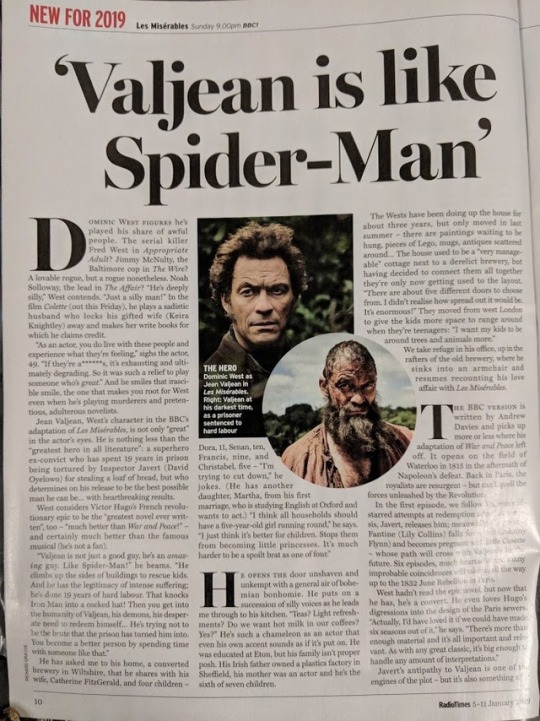
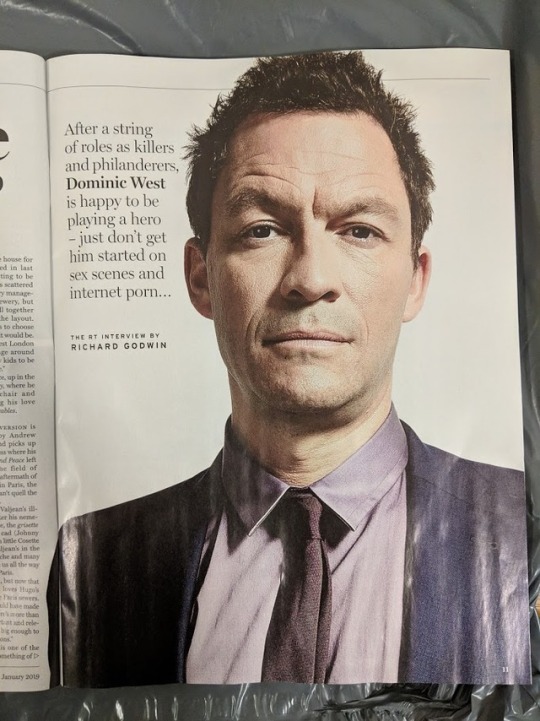

‘Valjean is like Spider-Man’
DOMINIC WEST FIGURES he's played his share of awful people. The serial killer Fred West in Appropriate Adult? Jimmy McNulty, the Baltimore cop in The Wire? A lovable rogue, but a rogue nonetheless. Noah Solloway, the lead in The Affair? "He's deeply silly," West contends. "Just a silly man!" In the film Colette (out this Friday), he plays a sadistic husband who locks his gifted wife (Keira Knightley) away and makes her write books for which he claims credit.
"As an actor, you do live with these people and experience what they're feeling," sighs the actor, 49. "If they're a******s, it's exhausting and ultimately degrading. So it was such a relief to play someone who's great." And he smiles that irascible smile, the one that makes you root for West even when he's playing murderers and pretentious, adulterous novelists.
Jean Valjean, West's character in the BBC's adaptation of Les Miserables, is not only "great" in the actor's eyes. He is nothing less than the "greatest hero in all literature": a superhero ex-convict who has spent 19 years in prison being tortured by Inspector Javert (David Oyelowo) for stealing a loaf of bread, but who determines on his release to be the best possible man he can be... with heartbreaking results.
West considers Victor Hugo's French revolutionary epic to be the "greatest novel ever written", too - "much better than War and Peace!" - and certainly much better than the famous musical (he's not a fan).
"Valjean is not just a good guy, he's an amazing guy. Like Spider-Man!" he beams. "He climbs up the sides of buildings to rescue kids. And he has the legitimacy of intense suffering; he's done 19 years of hard labour. That knocks Iron Man into a cocked hat! Then you get into the humanity of Valjean, his demons, his desperate need to redeem himself... He's trying not to be the brute that the prison has turned him into. You become a better person by spending time with someone like that."
He has asked me to his home, a converted brewery in Wiltshire that he shares with his wife, Catherine FitzGerald, and four children - Dora, 11, Senan, ten, Francis, nine, and Christabel, five - "I'm trying to cut down," he jokes. (He has another daughter, Martha, from his first marriage, who is studying English at Oxford and wants to act.) "I think all households should have a five-year-old girl running round," he says. "I just think it's better for children. Stops them from becoming little princesses. It's much harder to be a spoilt brat as one of four."
HE OPENS THE door unshaven and unkempt with a general air of bohemian bonhomie. He puts on a succession of silly voices as he leads me through to his kitchen. "Teas? Light refreshments? Do we want hot milk in our coffees? Yes?" He's such a chameleon as an actor that even his own accent sounds as if it's put on. He was educated at Eton, but his family isn't proper posh. His Irish father owned a plastics factory in Sheffield, his mother was an actor and he's the sixth of seven children.
The Wests have been doing up the house for about three years, but only moved in last summer - there are paintings waiting to be hung, pieces of Lego, mugs, antiques scattered around... The house used to be a "very manageable cottage next to a derelict brewery, but having decided to connect them all together they're only now getting used to the layout. "There are about five different doors to choose from. I didn't realise how spread out it would be. It's enormous!" They moved from west London to give the kids more space to range around when they're teenagers: "I want my kids to be around trees and animals more."
We take refuge in his office, up in the rafters of the old brewery, where he sinks into an armchair and resumes recounting his love affair with Les Miserables.
THE BBC VERSION is written by Andrew Davies and picks up more or less where his adaptation of War and Peace left off. It opens on the field of Waterloo in 1815 in the aftermath of Napoleon's defeat. Back in Paris, the royalists are resurgent - but can't quell the forces unleashed by the Revolution.
In the first episode, we follow Valjean's ill-starred attempts at redemption after his nemesis, Javert, releases him; meanwhile, the grisette Fantine (Lily Collins) falls for a cad (Johnny Flynn) and becomes pregnant with little Cosette - whose path will cross with Valjean's in the future. Six episodes, much heartache and many improbable coincidences will take us all the way up to the 1832 June Rebellion in Paris.
West hadn't read the epic novel, but now that he has, he's a convert. He even loves Hugo's digressions into the design of the Paris sewers. "Actually, I'd have loved it if we could have made six seasons out of it," he says. 'There's more than enough material and it's all important and relevant. As with any great classic, it's big enough to handle any amount of interpretations."
Javert's antipathy to Valjean is one of the engines of the plot - but it's also something of a mystery. Why does Javert hate him so much? "I always like to trace motivations to sex," West says. "I said to David, 'Javert obviously fancies him!' But he thought that was crass."
Did the rivalry extend off-set? "You're never quite sure where the character ends and the actor starts," he laughs. "But the key to David is that he's actually royal. He's a prince in Nigeria. And he doesn't drink. He's very religious. He's been married to his wife since he was 19 and they have four beautiful children. I hadn't realised people like that existed in the acting world! He's a very inspiring guy."
The co-stars decided it was the shared trauma of being institutionalised that set their characters against one another. "Valjean doesn't think he deserves anything other than brutality. Javert is constantly reminding him he's just a common criminal who breaks rocks and murders people."
Oyelowo is one of a number of non-white actors in the cast, marking a departure from traditional costume-drama casting. West jokes that he really wanted to do it all with 'A1lo'Allo accents, but: "Like any classic, it's not a museum piece. It has relevance to modern life. Eponine and the girls all talk like modern London girls. And therefore it looks like modern Britain, too."
THE PRODUCTION LOOKS likely to make Collins, as Fantine, a star. "She's incredible," says West. "It's an exhausting part. So harrowing. Any actress who goes for it deserves all the accolades she gets..." The first scene they shot together was Fantine's death, filmed in a freezing manor house outside Brussels at 5am. "She really went for it. I was like, 'Oh my God! How did you do those spasm things?' She said, 'I just made it up'." I imagine it's reassuring to have West on set: he is very experienced, but doesn't take himself too seriously. Do the younger actors come to him for advice? "Pfah! No. I'm jaded and lazy."
The Wire was the show that brought him fame, as well as a credibility not usually open to Old Etonians. But originally he didn't want to be in it. "And it turns out to have been the one thing that everyone knows me for and it was one of the best shows ever made! I think [creator] David Simon is almost the Victor Hugo of our time... certainly the Charles Dickens."
The Affair offers more escapist pleasure, its marital rows interspersed with good-looking people having sex (even if he doesn't think much of Noah). The Wests are about to decamp to LA for the filming of the final season, but it will be without Ruth Wilson this time. Last February, she disclosed in a Radio Times interview that she was "sure" she earned less than West. "I don't want more money, I just want equal money," she added. Not long after that her character Alison Bailey was killed off. What was all that about? "Oh, not related!" West yelps.
He remains good friends with Wilson. The main point of contention on set was whose behind would be visible in the sex scenes. "We used to fight about it. 'You're on top this time', 'No! I was on top the last three times!'"
He'd never given much thought to who was paid what, he says. "I never asked what the money is on a show. It was more a question of if I wanted to do it. So it woke me up to the issue. I never realised the disparity and the injustice."
It's one of a number of changes he has noticed since the #MeToo movement gained ground. "One thing that's happened is a positive discrimination in favour of female directors. But the main thing is that unacceptable behaviour from male directors or actors is now either not possible, or you can call them out on it. There was one guy in particular whose behaviour was disgusting. Particularly to young females in minor roles. I tried to counter it on several occasions. But now it wouldn't be so hard to get rid of them."
'Treatment of women has taken a big step back in television'
He twists his face in derision at those who feel the feminists have gone "too far". "Treatment of women has taken a big step back in the past 20 years," he says, his voice rising. "Particularly in television, which has become more pornographic and the burden of that falls squarely on young women. Things like Game of Thrones, where you get a pair of bare breasts every five minutes... I mustn't say this, but..." Say it!
"I'm fairly sure that 20 years ago young actresses would not have had pressure put on them to take their clothes off. The parts young actresses get, particularly pretty ones, involve violent rape. When I think about my daughter going into the profession... I'm just really glad that #MeToo has started to counteract what has happened in the past 20 years."
He puts it down to internet porn - "It's made boys feel that women are sex objects who are easily available" - as well as social media. "If you can swipe someone's face because you don't think they're pretty and it costs you that little... I haven't done it myself, but it cheapens it."
HE's CONCERNED AT the turn the world is taking: he mentions Trump, climate change, teenage boys becoming addicted to the online game Fortnite. A wariness of modernity seems to have inspired the move to the countryside; he and his wife are "luddites", he confesses. "I'm not one of those people who say, 'How can you bring children into this world?' But I do want to spend a lot more time hanging out with my kids and running around in forests."
Once he has finished filming the last season of The Affair, he plans to hire an enormous camper van, bundle the entire family into it and spend a few months driving around the States.
"It's the last chance we have," he explains. "They're nearly teenagers, so they're not going to want to spend that much time with their old man for much longer. I've spent a long time away from them. So we're taking six months, four months of it travelling. I've taken them out of school - there are no big exams. We'll home school them. They'll read. No screens. You're not going to get a better education than that. If you travel with as little as possible, you get much more interesting experiences."
Radio Times 5-11 January 2019
#les mis bbc#bbc les mis#dominic west#Jean Valjean#valvert#david oyelowo#javert#Lily Collins#fantine#Interviews#articles#radio times
85 notes
·
View notes
Text
So, Tuesday marks the end of U2's Experience and Innonce tour. And being brutally honest, it could be a while before we hear from them again. But I 1000000000% believe there's a melody inside of them, and that's going to lead them back to the studio.
This tour has been the first one I've really ever been tracking. If you don't already know, I became a fan of U2 December 2017, less than one year ago. Songs of Experience was the first album I listened to on my own, and that led me to finding this community of people. Of course, there were things I didn't understand about U2 at the time, but I've learned.
Enough about that.
SO THE TOUR... it's been insane. I remember everytime I saw a picture of Macphisto, I would dream about how much I would give to see Bono play him again

Um, it happened? :)
There were so many highlights for me with this tour. I had to wait a little over a month for my concert in Boston, and there were things that my mom suggested to me I try and remain spoiler free from, and I did. Alot of it revolved around the screen, and I did pretty well with that(?) And then after a few shows, I just stopped listening to the mixlr's of the concert. I'm glad I did, because they sounded so so so good, and those visuals on the screen.
Guys. Cedarwood Road. The intermission.

Larry's glasses. I'm sorry but I love them so much :'3
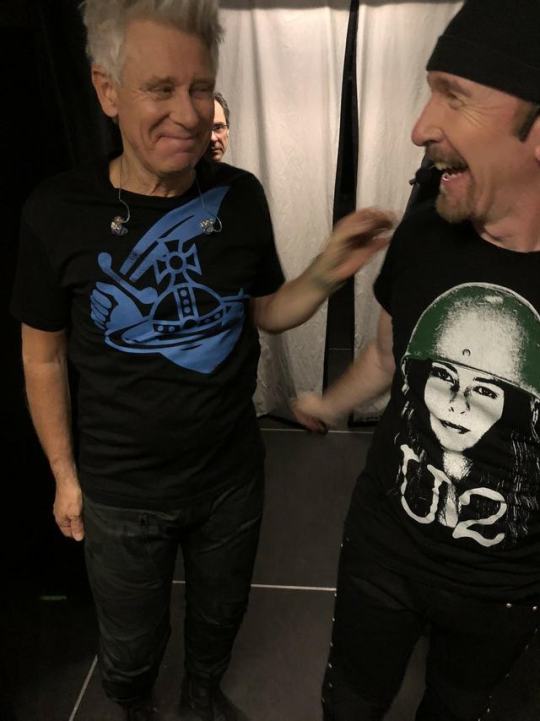
Adam was precious as usual. Also that new LED bass he's had.

Edge was, well, godlike.

And of course, our showman, Mr. Bono Vox
Everything fit perfectly with this show, they did a fantastic job using their magic and creating some amazing setlists. Also, shoutout to U2's amazing crew, for building and pulling down the set.
NOW JUNE 22ND



I can still hear Bono's voice saying hello to me. And Edge's crinkly eyes as he leaned over to shake my hand. And their hug. I loved that hug, and I get to see it everyday (it's the wallpaper on my phone)

I know this photo got uploaded in black and white, but I found it in color recently. That hand you see, its mine. That's how close I was to him
Of course, there has been changes to the Europe leg. And there have been some things we all didn't want happening, but they still have pushed through.
I know we are all sad to see U2 go, but dont cry because it's over, be glad because it happened. Be glad we got to see 4 irish men do what they love for us. Be glad we got to hear songs from them that we might never had heard otherwise. Be glad we all, in some way got an interaction with the band, whether it be eye contact during the show, meeting them before, getting an autograph, heck even getting on their social media. Be glad.
If U2 ever found this post, I want them to know one thing. ENJOY THIS BREAK. Rest. Spend time with your families. Fall in love with yourselves again. You totally have deserved it.
I want to thank everyone who has made friends with me. I know that recently I've been having a hard time with my mental health, and so many of you are so so supportive along my road to recovery. If your name isnt on this list, the reason why is because this post would be way too long. But I love all you guys so much, and I hope I get to meet you guys in person one day,
@bonos-grindcore-sideproject @hornedchick @dismantlinganatomicbomb @larrymullenband @larrymullens @i-blame-this-on-sherlock
Thank you guys so much. While one chapter might be ending, so many more are just beginning
Here's to more joy, laughter, love, peace, music, bedge, badam, barry, friendships, and of course U2
❤
Owly
22 notes
·
View notes
Text
MONTREAL — If Xavier Dolan could direct a film about his life, he says, the opening scene would show the first encounter between his headstrong and emotional Quebecer mother and his Egyptian-born womanizing father, at a bohemian bar in Montreal where his mother had gone to hear his father sing.
This being a Dolan production, there is a good chance the mother would be overbearing, vulnerable and exquisitely made up. The camera would zoom in unforgivingly. The emotions would be volcanic, and ecstasy would soon give way to agony, accompanied by the frenetic beats of a music video.
His parents’ marriage ended when Mr. Dolan was 2 and a half years old. By the time he was 8, his mother, unable to cope with her hyperactive son, sent him to boarding school in rural Quebec, where the young gay boy was mercilessly bullied and where, in turn, he tormented others. He found refuge in Hollywood films like “Titanic” and “Mrs. Doubtfire,” along with the psychodrama of kitsch American sitcoms.
Today, Mr. Dolan — celebrated actor and director, Louis Vuitton model, voice-over artist (he provided the voice of Ron Weasley in the French Canadian versions of the “Harry Potter” movies), darling of the Cannes Film Festival, former child star and art-house cinema wunderkind — says the fuel for his art is his lost childhood. He has directed seven films. He is 29.
“I wanted to get out of childhood as soon as possible and escape it, and now that I’m making movies, I’m chasing it,” he said during an eight-hour interview that had all the intensity of a Dolan film, accented by allusions to Proust and a heavy snowfall outside. It began at Montreal’s opulent St. James Hotel before migrating to his handsome Edwardian house, which, he notes, channels the red chinoiserie of Diana Vreeland’s lush New York apartment.
“What I have been feasting on all these years is nostalgia — a nostalgia for the childhood that I didn’t end up having,” he added.
Waiflike and compact, wearing a hoodie and with a tattoo of Dumbledore(of “Harry Potter” fame) on his left arm, Mr. Dolan peppers his sentences in English with words like “prolix” and “epistolary,” and only occasionally switches into French to emphasize a point. He used part of his earnings as a child star to take Berlitz classes in English. Even early on, he said, he realized that if he was going to conquer Hollywood, he would need to speak fluent English.
In person, Mr. Dolan is at once intense and cerebral, funny and self-deprecating.
He has sometimes been pilloried as impish and arrogant, and he bristles at being labeled an “enfant terrible,” as he often is. It is perhaps an occupational hazard for a director who has been variously compared to Alfred Hitchcock, Woody Allen and the poet Arthur Rimbaud.
He made his first film, “I Killed My Mother,” a Freudian-tinged, semi-autobiographical film about a gay teenager who clashes with his mother, after he dropped out of college at 17. As one producer after the other rejected it, he scraped together money from his child-acting gigs to make the film himself, at age 20, eventually winning international acclaim. When he later noted wryly that Orson Welles, who made “Citizen Kane” at 25, was a “late bloomer,” the critics pounced, and he turned to Twitter to explain that he had been joking.
“I’m a big mouth. People can dislike me and think I’m a narcissistic brat,” he said. “But one thing no one can ever take away from me is that I’ve always spoken my mind, and I have always been true to myself.”
As we meet, he is the subject of a social media storm over his decision to cut the American star Jessica Chastain from his soon-to-be released film, “The Death and Life of John F. Donovan,” his first English-language film. The movie focuses on an 11-year-old boy and his unlikely correspondence with a closeted actor that is contorted into scandal. (When he was 9 years old, Mr. Dolan wrote a letter to Leonardo DiCaprio, requesting a meeting. He got the address wrong, and it is now framed in Mr. Dolan’s house.)
In the deeply moving film, shot in London, Montreal, New York and Prague, the boy, now a grown man, tells a hard-bitten journalist about how Donovan, torn between fame and personal fulfillment, had changed his life. The original cut of the movie, which stars Kathy Bates, Natalie Portman and Susan Sarandon, and has added cultural resonance in the #MeToo era, was more than four hours long. Eliminating Ms. Chastain, he says, was predicated solely on her character no longer fitting the story line.
“People are saying: How can you cut someone so famous?” he said. “To me, that’s an insult to her talent.”
Born in Montreal, Mr. Dolan was raised by his single mother, Geneviève, a college administrator with Irish roots. He began appearing in commercials for a drugstore chain at the age of 4, and by the time he was 6 he was a child star, appearing in movies, television shows and commercials.
Mr. Dolan’s films, a cri de coeur for tolerance, are invariably populated by outcasts and underdogs, a reflection, he says, of his own feelings of not belonging. When he was 8, he recalled, a bully on a bike plowed over him in the schoolyard. “At that moment, I decided that my world was in the movies and in the shows,” he said. “Anywhere but real life.”
Continue reading the main story
He remembered a kindly headmaster letting him escape bullies by allowing him to watch his beloved American sitcoms in an empty dormitory. Later, he added, the headmaster, who was accused of pedophilia, killed himself.
After Mr. Dolan was catapulted to cinematic fame with “I Killed My Mother,” he made a raft of French-language films, including “Laurence Anyways,” an ill-fated love story featuring a transgender schoolteacher. In his most critically acclaimed movie, “Mommy,” which shared the Jury Prize at Cannes in 2014, a mother played by his muse, the Quebecer actress Anne Dorval, tries to tame her violent son.
Unifying nearly all of his films are strong-willed but vulnerable female characters who provide succor to emotionally wounded sons. “I was brought up by women. I never had a father figure,” Mr. Dolan said. “Of course, there is a part of my mother in these strong women, and of course, there is a part of me.”
While his films can divide critics, they seldom leave the viewer indifferent. His last film, “It’s Only the End of the World,” about a gay man who comes home to his family in rural France to tell them that he is dying, was booed at Cannes in 2016, but won the Grand Prix. More than a year later, Mr. Dolan is still smarting from the eviscerating criticism (the film, with A-list French actors such as Marion Cotillard, is hard to watch, and it deals an emotional body blow, with characters who brutally turn on one another).
“I still feel scared to disappoint people and to be criticized or mocked,” he reflects. “I wasn’t like that before.”
Mr. Dolan admits that his romantic life has been largely devoid of longer-term relationships because he tends to be attracted to unattainable heterosexual men. His latest crush is Canada’s prime minister, Justin Trudeau. In the same way, he said, he really made friends only in his late 20s, after an adolescence consumed by work.
“The love stories that I have found that are reciprocal are in movies,” he said, with more than a hint of wistfulness.
His next film, “Matt and Max,” recounts the story of two heterosexual male 20-somethings who share a kiss, and the impact it has on their lives. After a slew of thoughtful films with gay themes, such as “Call Me by Your Name” and “God’s Own Country,” Mr. Dolan said he wanted to reflect on unrequited love — his unrequited love.
As I am leaving, he suddenly stops me and looks me in the eye. “I don’t want you to think my parents were monsters,” he said. “My childhood really wasn’t that bad.”
18 notes
·
View notes
Photo

Why So Little Catholic Concern Over Christian Persecution?
A recent poll of U.S. Catholics reveals that they are more concerned about climate change and the global refugee crisis than about the global persecution of Christians.
According to Aid to the Church in Need, “Christians are the victims of at least 75 percent of all religiously motivated violence and oppression.” The report adds that some 215 million Christians face severe persecution, mostly at the hands of Muslims.
Why do Catholics rank the persecution of Christians as a lesser concern than climate change, poverty, human trafficking, and the refugee crisis? One reason might be that we live in an image-oriented society, and images of people in trouble personalize the crisis in a way that text alone does not. Pictures of people in danger from hurricanes, floods, and forest fires are omnipresent—a constant reminder of the dangers supposedly caused by climate change. By contrast, images of persecuted Christians are in short supply. Hence, their crisis seems less immediate.
According to the ACN figures, there are many more Christians in danger of persecution than there are refugees endangered by the hazards of migration. Yet the plight of the refugee remains a higher priority for Catholics. That’s because pictures of refugees abound, and pictures of persecuted Christians do not. Moreover, if you can believe the pictures, the great majority of these refugees are women and children. In addition, Catholics are given the impression by their bishops that the plight of the refugees is somehow the fault of hard hearted Westerners who fail to follow Christian injunctions. That, of course, makes the crisis all the more personal and immediate.
There are several reasons why photos of persecuted Christians are less readily available. One reason is that there may be danger involved in taking them or acquiring them. Another possibility is that there is less demand for them. Pictures generally accompany stories in newspapers or on television news. But stories about Christian victims seems to be a low priority for the media. And because there are fewer stories on the subject, there is less demand for images to accompany them.
On the other hand, stories (and, hence, pictures) about immigrants and refugees are a more lucrative business. There is actually a market for them. For example, it was recently revealed that the Irish government has been paying journalist to write positive stories about Project Ireland 2040, a 116 billion Euro plan to bring in a million migrants to Ireland. Since the population of Ireland is only 4.7 million, that’s a hard sell. But with the help of the media, the government hopes to sell it.
Likewise, America’s Catholic bishops have been paid as much as 90 million per year to resettle refugees. That may be a part of the reason that the bishops are currently involved in a massive campaign to highlight the plight of migrants and refugees. It may also explain why the foyers of Catholic churches are filled with pictures of migrants rather than pictures of persecuted Christians.
There’s another reason we don’t often see pictures of Christian persecution, and it’s a bit more sinister. There appears to be a deliberate attempt on the part of government and media to suppress news of Christian persecution. That’s because in order to tell the full story you would have to get into the bothersome detail of identifying the persecutors. That, in turn, would put Islam in a bad light, and that is something that media, government, and Church elites would prefer not to do.
Take the case of Marine Le Pen. She ran for French President in the last election, but she’s also run afoul of the French courts for tweeting violent images. The photos she posted were of Islamic State executions. As a result, she now faces a heavy fine and a possible three year prison sentence—which may require a reworking of the old maxim into something like “a picture is worth a thousand days (in jail.)”
Last year it was revealed that the French government had also suppressed pictures of the brutalized victims of the jihad attack on the Bataclan Theatre. In addition, it was reported that a French priest, Fr. Guy Pages, had been arrested for embedding photos on his website of the carnage at the Bataclan. In short, the authorities don’t seem to make any distinction between the perpetrators of the evil deed and the ones who expose it.
But let’s get back to Le Pen. She had posted the execution pictures in the first place to counter charges that her political party was just like ISIS. The three photos did not involve the execution of Christians per se, but such photos (and videos) exist, and one supposes that if she had posted them the result for her would have been the same.
Although she was charged with “distribution of violent images,” it’s likely that the chief problem was not the violence itself, but the fact that the violence was being committed in the name of Islam. Thus, the posting of the pictures could be taken as a criticism of Islam—something that is beyond the pale in polite French society. The images might also remind the French public that the government’s policy of facilitating mass Muslim migration is not such a good idea.
From the way the French press described Le Pen’s actions, one would think she was the one responsible for the gruesome murders. Her actions were branded as “insensitive” and “shameful.” Yet it’s doubtful that the authorities were really worried about insensitivity. Her real crime in their eyes is that she had exposed an ugly aspect of the ideology that the authorities themselves were importing into French society.
In a way, it’s reminiscent of the protests against the “insensitive” images of aborted babies that pro-lifers carried in demonstrations. Of course, the real problem with the pictures was not that they were insensitive, but that they exposed the reality of the procedures that the pro-choice organizations were endorsing. In this regard, it’s important to note that it was not until ultrasound pictures of babies in the womb became widely available that the tide began to turn against abortion.
It’s no wonder that the Catholics who were polled about the five global concerns put persecution of Christians at the bottom of the list. Most Catholics don’t realize how brutal, oppressive, and widespread this persecution is. Nor do they realize how deeply involved Muslims are in the oppression.
They don’t realize because the full picture had been withheld from them. Moreover, it’s not just governments that suppress negative news about Islam. Big businesses—particularly social media giants—do the same. Goggle makes it difficult to find Islam-critical sites, Facebook shuts them down, and YouTube censors them.
One example comes from Raymond Ibrahim who, because of his extensive knowledge of Islamic history and his fluency in Arabic, is a particularly effective critic of Islam and Islamists. In a recent article, Ibrahim discusses YouTube’s practice of putting restrictions on Prager University for producing videos that violate their “community Guidelines,” and are thus “not appropriate for a younger audience.”
One 5 minute video that Ibrahim made for Prager University is entitled, “The World’s Most Persecuted Minority: Christians.” Most of the video consists of Ibrahim talking to the camera in a calm and measured manner. The rest is maps, pie charts, graphs, and occasional stick figures who are no more threatening than a 5 year old in a Halloween costume. Yet Ibrahim’s video is identified by the “YouTube community” as “inappropriate or offensive to some audiences.”
One suspects that the really offensive thing about Ibrahim’s fact-filled presentation is that it throws a wrench in the media’s positive narrative about Islam. In his video, Ibrahim notes:
If this were happening to any other group besides Christians, it would be the human rights tragedy of our time. There would be loud worldwide calls for action.
But there isn’t. Instead there is silence: a deliberate attempt by government, media, and Internet giants to suppress the story and the pictures of persecuted Christians. In the future, we can expect more and more attempts to withhold videographic information about the Islamic persecution of Christians on the grounds that it’s not appropriate for us to know. It may be true that one picture is worth a thousand words—but that’s only if you get to see the picture.
The World's Most Persecuted Minority: Christians
Written by: WILLIAM KILPATRICK
25 notes
·
View notes
Text
The Vixen Bites Back
This is going to be an overview / opinion on all the goings on across Episode 2,3 and Untucked!!
To start I've officially gotten over my lack of remembering names and continue to be 100% in love with this season, because even if the challenges are a bit Wah-Wah the fucking Queens are everything!!
First off, I'm just going straight there. The Vixen. I thought initially she was going to bug me because she was seeking drama for dramas sake. However, as I think Cracker rightly says, this girl is SMART. If you didn't catch episode 3 and specifically Untucked for that one, well you've missed out on a Queen telling it exactly how it is, pulling no bullshit and finally speaking all the truth!
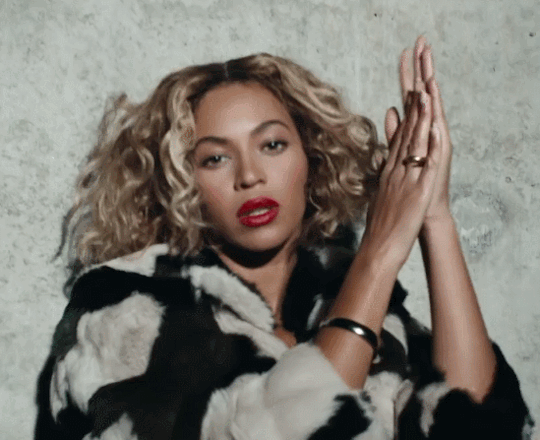
Yes The Vixen, Yes! This Queen and Aquaria have been going in on each other and it has not been one sided. Aquaria was giving it all that on her high horse about Cracker stealing from her. She wasn't afraid to mouth off when she felt safe and hidden from her "foe". However The Vixen had zero issue in calling bullshit once Aquaria decided to dodge the opportunity to confront Cracker back in the workroom, which was weird since she did say that it was her intention to do so...

Yet for some reason as episodes pass, Aquaria decided to go ahead and poke the bear some more. When she called out The Vixen for that wig swap what was she expecting exactly? To not get bitten back?
The genius of The Vixen is that she is prepared and able to argue back. And not in a bitchy way, she is able to have her bullet points lined up and completely call out anyone's shit. She's clever and I imagine she would happily go toe to toe with anyone in a debate. Where it all fell down for Aquaria however is that she is unable to bring the debate back to her.
Aquaria is like the embodiment of social media culture. She is happy to say something that may cause some controversy or be a bit bitchy so long as she feels safe, like any keyboard warrior. But there is nowhere to hide here so once she suddenly has to take a rebuttle, she immediately feels "attacked". And she's not, she's not attacked, she's not being bullied, she is simply getting her comeuppance for the things she says. But since she doesn't have the wit to stand behind what she says, she feels hurt.
Look I'm all for empathy, to my detriment at times, but it is hard to feel sorry for Aquaria in these confrontations with The Vixen. And I don't think that means Aquaria deserves to be attacked or have her character assassinated but I also don't think that The Vixen should have to monitor what she says to her.
The Vixen made it clear that she is ready to stand her ground, she doesn't scream or threaten, she simply provides a logical argument. Take the wig scenario, Aquaria mentions that clearly the runway doesn't matter in her view, so The Vixen can obviously rebutte that that statement makes her poking about the wig redundant. And she's right.
In Untucked we see the whole situation get brought up again only now even Dusty gets to comment on her feelings of Aquaria being cold outside of the show. This all results in Aquaria "crying".

Aquaria's emotions came from being called out and it was an instant defence mechanism. It wasn't because of any one thing hurting her, it was embarrassment. Jesus, we've all been there, done or said something to look dumb or make a mistake and once we get caught or called out sometimes it can be easier just to play the victim a bit. Or is that just me?! It's not right, but it happens. And it doesn't make Aquaria a bad person, it just makes her a bit immature.
The Vixen does an incredible job of pointing out the facts here with a level of fourth wall breaking that would put Deadpool to shame as she highlights the fact that to the viewer she will be painted as the "angry black woman". I'm not even going to pretend I can relate to that, I'm whiter than Casper the ghost, but there are some Drag "fans" out there who spew some of the most vile and racist shit you can imagine. It's something I can't wrap my head around to be honest and I don't think the scumbags who do that are actual fans.
From what I can see, the black community has been historically ground breaking in terms of Drag. The very show they are watching was created by a black Drag Queen. It is one of the most diverse shows that there is on TV.
But the fact is most, if not all, of the Black Queens who have been on Drag Race get horrid, racially driven abuse and it is disgusting. It's as if they like the white girls who try to act like black girls but not the actual black girls.
So to see The Vixen put it out there plainly as she did was a champion moment for her. And even her response when Aquaria mentioned that she understood, and I believe she did, was simply to tell her to act like it. That was brilliant. She didn't go after her, she didn't row with her she simply asked her to prove herself by her actions, not just her words.
I mean, clearly this was back then and I imagine we will see growth from Aquaria in this sense but in the larger scheme of things and the social media culture around Drag Race I think The Vixen has done an incredible job of speaking up and fighting for something that I believe she really came to the competition to fight against. The Vixen could prove to be one of the more important contestants to come on this show in terms of calling out the bullshit behaviour that happens online and I am here for it.
And while the race issue is one that does not deserve to be diluted, I think her points even go beyond race. This ability to say whatever to someone and not to be prepared for an argument back is 140 character behaviour. To play the victim, to pull the "bullied" card is done so readily at times and I am so happy to see an intelligent and strong person who is ready and able to reach through the screen and confront the keyboard warrior.
And on with the show...
With my thoughts on The Vixen out there I'll move on!
The Pharmarusical episode featured Andy Cohen who I am not here for ever since that moment where he insulted Trixie while she was RIGHT THERE but he showed up anyway for the mini challenge and for that weird cameo during the performance.
I thought Monique Heart got it a bit rough during critiques because I thought she was pretty good during her performance but then what do I know? Really love her though, a stunnah in drag and seems so lovely and sweet, I hope her momentum starts to take off. She was hilarious during the Ep3 mini challenge as well, I cannot wait to see what she's got planned for Snatch Game!!
I'm keeping an eye on Blair as well, I get the feeling this could be that Queen that does a Dela/Jinx in Snatch Game should she make it that far.
Cracker continues to shine for me, I don't know what it is there is just something about how she carries herself or her delivery or something that is so endearing. She puts the C in C.U.N.T.
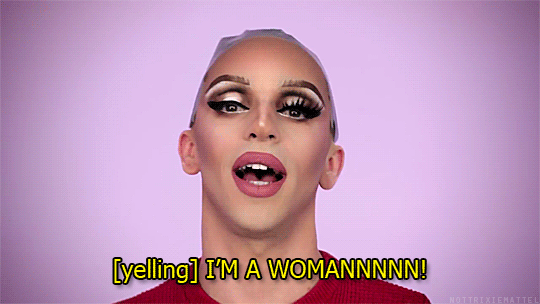
I don't think Cracker has had a chance to peak yet but I feel like she's on a steady rise.
Asia is another one that I just love, her sense of humour seems so great and I said it in my first post and I'll say it again as a Queen, beautiful, as a boy gorgeous. As soon as she blew up her fringe during that runway I was sold, it was beyond cute it was fucking extra. Yes the gag of her face was funny during during the App challenge but I felt like the runway really won that for her and I was so happy to see her with a win. I'd love to see Asia go all the way.
This isn't even a review anymore, it's not linear at all but I need to interject and just throw Mayhem Miller's lip sync in here right now because WOW! I knew she'd be an incredible lip syncer and I was proven right.
This also leads me to wishing we saw more of a genre mix with LSFYL songs because there is something so badass seeing ladies who rock celebrated on that stage and I think that grungy rock music makes for a really exciting battle. Don't get me wrong, I adore me some pop and I live for soul and disco but my heart beats to a good drum and bass line so I do hope we see a bit more rock tunes added to the mix.
I mean Aja doing Alanis Morisette Ironic is flipping awesome! YouTube that shit.
Mayhem landing in the bottom this early on is probably exactly what she needed and a chance to see her perform was welcomed.

Eureka was fucking annoying as hell episode 2, Asia has the patience of a saint! I enjoyed Eureka during her stint on S09 but so far on 10 she's not doing anything to win me over and feels kind of out of place to me.
Monet was great during the Ep3 mini challenge, as an Irish girl I just loved her weird Irish thing that just came out of nowhere but when she did the "Erin go brea" singing I was in stitches, way to not just attempt some Paddy whackery SNL nonsense and just be funny and irreverent with it girl.
Also these fucking sponges turning up in every episode is getting ridiculous and I hope it never ends, I hope they don't even point them out they just keep using them like Monique during Untucked.

Poor Yuhua sashayed away Ep3 after a brutal challenge performance and too much air guitar. And by too much I mean any. I really liked her but I feel like she gets that the hard work starts after the show so I think we will get more from her.
Kalorie of course went Ep2, again a sweet queen but I don't think she was going to bring much more to this competition, the standard is so strong this year. She's a beautiful queen though.
I covered alot around Aquaria and The Vixen above but I will say that Aquaria has the potential to turn shit around for herself and I think she has the ability too. If she can accept her mistakes and learn from them she will do well, she's not afraid to act a fool in challenges and her runway is great.
I am afraid The Vixen might falter on challenges particularly when it boils down to acting or comedy in comparison to some of the others, I just get that vibe from her but she was funny in the Ep2 and 3 performances so hopefully I'm wrong because I really like her at the moment.
Dusty Ray Bottoms and Kameron Michaels are 2 I always forget until last. Which is weird because I don't dislike them, I thought both performed great on Ep2 and Dusty on Ep3. I adored Kamerons runway, someone on Reddit made a Final Fantasy VIII connection and I fucking loved it even more, I don't care if she never even heard of the game in terms of costume I lived for it.
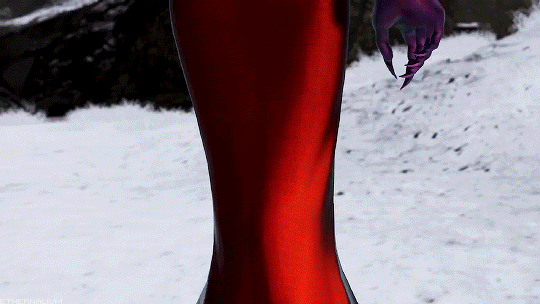
Dusty's story of how he was treated when his parents found out he was gay was heart breaking. It's hard to imagine anyone getting treated like that just because of their sexuality, it would be amazing to see that situation get resolved for him but i think he's obviously done an incredible job of not letting it hamper his own life.
Unfortunately, Dusty on the runway Ep3 was a let down for me and i think she needs to win over the judges big time because should she land in the bottom, I don't think she'll stay.
Am i missing anyone? I don't think so.
Oh wait, I am. Alyssa Edwards was the choreographer on Ep2 and all I can say is the producers better find every opportunity they can to get her back, back, back again.
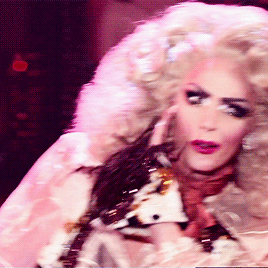
To finish up, despite some piss poor challenges this season really is all about the Queens. If you follow the show, make sure you get behind them on social media and all the rest. And leave all that bullshit racism and threats to the side, it's ugly and pathetic.
Looking forward to Ep4 which is the End of the World Ball. Love that they are getting another design challenge so soon!!
#drag race#rupaulsdragraceseason10#rupaul#rupaul's drag race#the vixen#aquaria#mizcracker#monet x change#monique heart#drag#drag queen
8 notes
·
View notes
Text
Fall is just around the corner…and there are exciting highly anticipated new releases that will make you excited for the cooling weather! And this month is perfect to make use of your library card (or sign up for a new one) because of National Libray Card Sign-Up Month. From highly sought out sequel to an upcoming romance from a popular author, September will be one busy month from book lovers:

The Testaments by Margaret Atwood
Expected Publication: September 10
And so I step up, into the darkness within; or else the light.
When the van door slammed on Offred’s future at the end of The Handmaid’s Tale, readers had no way of telling what lay ahead.
With The Testaments, the wait is over.
Margaret Atwood’s sequel picks up the story 15 years after Offred stepped into the unknown, with the explosive testaments of three female narrators from Gilead.

Home Girl by Alex Wheatle
This isn’t my home. Haven’t had a proper home since . . . This is just somewhere I’ll be resting my bones for a week and maybe a bit. This time next year you’ll forget who I am. I haven’t got a diddly where I’ll be by then. But I’m used to it.
New from the UK-based best-selling black British author and winner of the Guardian Children’s Book Award, Home Girl is the story of Naomi, a teenage girl growing up fast in the foster care system. It is a wholly modern story which sheds a much-needed light on what can be an unsettling life—and the consequences that follow when children are treated like pawns on a family chessboard.
Home Girl is fast-paced and funny, tender, tragic, and full of courage—just like Naomi. It is Alex Wheatle’s most moving and personal novel to date
I’m currently reading this right now and I find it both heartbreaking and entertaining and would be engaging to any reader who is a fan of realistic fiction.
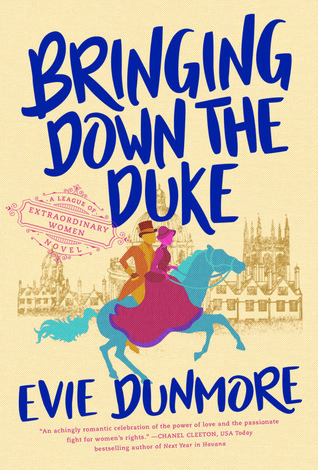
Bringing Down the Duke by Evie Dunmore
England, 1879. Annabelle Archer, the brilliant but destitute daughter of a country vicar, has earned herself a place among the first cohort of female students at the renowned University of Oxford. In return for her scholarship, she must support the rising women’s suffrage movement. Her charge: recruit men of influence to champion their cause. Her target: Sebastian Devereux, the cold and calculating Duke of Montgomery who steers Britain’s politics at the Queen’s command. Her challenge: not to give in to the powerful attraction she can’t deny for the man who opposes everything she stands for.
Sebastian is appalled to find a suffragist squad has infiltrated his ducal home, but the real threat is his impossible feelings for green-eyed beauty Annabelle. He is looking for a wife of equal standing to secure the legacy he has worked so hard to rebuild, not an outspoken commoner who could never be his duchess. But he wouldn’t be the greatest strategist of the Kingdom if he couldn’t claim this alluring bluestocking without the promise of a ring…or could he?
Locked in a battle with rising passion and a will matching her own, Annabelle will learn just what it takes to topple a duke….(Credit: Berkely)
Girl by Edna O’Brien
Expected UK & Irish Publication: September 5
Expected US Publication: October 15
I was a girl once, but not any more.
So begins Girl, Edna O’Brien’s harrowing portrayal of the young women abducted by Boko Haram. Set in the deep countryside of northeast Nigeria, this is a brutal story of incarceration, horror, and hunger; a hair-raising escape into the manifold terrors of the forest; and a descent into the labyrinthine bureaucracy and hostility awaiting a victim who returns home with a child blighted by enemy blood. From one of the century’s greatest living authors, Girl is an unforgettable story of one victim’s astonishing survival, and her unflinching faith in the redemption of the human heart. (Credit: Faber Faber)
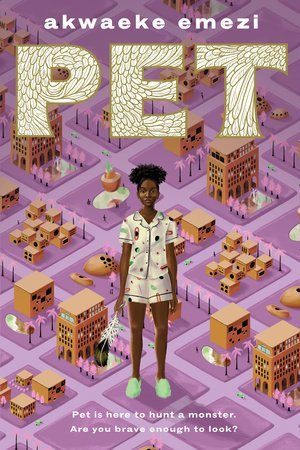
Pet by Akwaeke Emezi
Expected Publication Date: September 10
Pet is here to hunt a monster.
Are you brave enough to look?
There are no more monsters anymore, or so the children in the city of Lucille are taught. With doting parents and a best friend named Redemption, Jam has grown up with this lesson all her life. But when she meets Pet, a creature made of horns and colours and claws, who emerges from one of her mother’s paintings and a drop of Jam’s blood, she must reconsider what she’s been told. Pet has come to hunt a monster, and the shadow of something grim lurks in Redemption’s house. Jam must fight not only to protect her best friend, but also to uncover the truth, and the answer to the question-How do you save the world from monsters if no one will admit they exist?
In their riveting and timely young adult debut, acclaimed novelist Akwaeke Emezi asks difficult questions about what choices a young person can make when the adults around them are in denial. (Credit: Make Me A World)
The Institute by Stephen King
Expected Publication: September 10
As psychically terrifying as Firestarter, and with the spectacular kid power of It, The Institute is Stephen King’s gut-wrenchingly dramatic story of good vs. evil in a world where the good guys don’t always win. (Credit: Scribner)
Red At The Bone by Jacqueline Woodson
Expected Publication Date: September 17
An unexpected teenage pregnancy pulls together two families from different social classes, and exposes the private hopes, disappointments, and longings that can bind or divide us from each other, from the New York Times-bestselling and National Book Award-winning author of Another Brooklyn and Brown Girl Dreaming. (Credit: Riverhead Books)

Suggested Reading by David Connis
Expected Publication Date: September 17
Clara Evans is horrified when she discovers her principal’s “prohibited media” hit list. The iconic books on the list have been pulled from the library and aren’t allowed anywhere on the school’s premises. Students caught with the contraband will be sternly punished.
Many of these stories have changed Clara’s life, so she’s not going to sit back and watch while her draconian principal abuses his power. She’s going to strike back.
So Clara starts an underground library in her locker, doing a shady trade in titles like Speak and The Chocolate War. But when one of the books she loves most is connected to a tragedy she never saw coming, Clara’s forced to face her role in it.
Will she be able to make peace with her conflicting feelings, or is fighting for this noble cause too tough for her to bear? (Credit: Katherine Tegen Books)

The Water Dance by Ta-Nehisi Coates
Expected Publication Date: September 24
In his boldly imagined first novel, Ta-Nehisi Coates, the National Book Award–winning author of Between the World and Me, brings home the most intimate evil of enslavement: the cleaving and separation of families. (Credit: OneWorld)
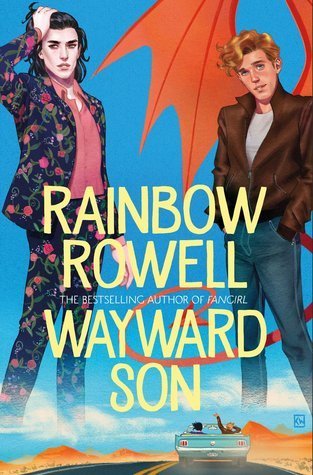
Wayward Son by Rainbow Rowell
Expected Publication: September 24
With Wayward Son, Rainbow Rowell has written a book for everyone who ever wondered what happened to the Chosen One after he saved the day. And a book for everyone who was ever more curious about the second kiss than the first. It’s another helping of sour cherry scones with an absolutely decadent amount of butter.
Come on, Simon Snow. Your hero’s journey might be over – but your life has just begun. (Credit: Pan Macmillan)

Slay by Brittney Morris
Expected Publication: September 24
By day, seventeen-year-old Kiera Johnson is an honors student, a math tutor, and one of the only Black kids at Jefferson Academy. But at home, she joins hundreds of thousands of Black gamers who duel worldwide as Nubian personas in the secret multiplayer online role-playing card game, SLAY. No one knows Kiera is the game developer, not her friends, her family, not even her boyfriend, Malcolm, who believes video games are partially responsible for the “downfall of the Black man.”
But when a teen in Kansas City is murdered over a dispute in the SLAY world, news of the game reaches mainstream media, and SLAY is labeled a racist, exclusionist, violent hub for thugs and criminals. Even worse, an anonymous troll infiltrates the game, threatening to sue Kiera for “anti-white discrimination.”
Driven to save the only world in which she can be herself, Kiera must preserve her secret identity and harness what it means to be unapologetically Black in a world intimidated by Blackness. But can she protect her game without losing herself in the process? (Credit: Simon Pulse)

No Judgements by Meg Cabot
Expected Publication: September 24
When a massive hurricane severs all power and cell service to Little Bridge Island—as well as its connection to the mainland—twenty-five-year-old Bree Beckham isn’t worried . . . at first. She’s already escaped one storm—her emotionally abusive ex—so a hurricane seems like it will be a piece of cake.
But animal-loving Bree does become alarmed when she realizes how many islanders have been cut off from their beloved pets. Now it’s up to her to save as many of Little Bridge’s cats and dogs as she can . . . but to do so, she’s going to need help—help she has no choice but to accept from her boss’s sexy nephew, Drew Hartwell, the Mermaid Café’s most notorious heartbreaker.
But when Bree starts falling for Drew, just as Little Bridge’s power is restored and her penitent ex shows up, she has to ask herself if her island fling was only a result of the stormy weather, or if it could last during clear skies too. (Credit: William Morrow Paperbacks)
Books to Read This Month: September Edition Fall is just around the corner...and there are exciting highly anticipated new releases that will make you excited for the cooling weather!
#Books#Diversity#Diversity in Books#Edna O&039;Brien#Historical Fiction#Jacqueline Woodson#Margaret Atwood#Meg Cabot#Rainbow Rowell#Stephen King#The Handmaid&039;s Tale#The Testaments#UK Bestsellers#UK YA Books#We Need Diverse Books#YA Authors#YA Books
0 notes
Text
Hello again! I’ll try to start this where I left off last. I believe I left you with my brothers trip out here, needless to say, the rest of January and all of February were just as eventful. Immediately after dropping my brother off I had one last essay to complete so the next few days were spent in the comfort of the University Library. Once I successfully submitted my essays a night out with my course mates was in order See Pictures here. With a couple of weeks to go until the next semester started, I decided to go back to London once again to visit my friend Kelsea and check out some of the many sites the city has to offer, see pictures. Upon returning to Bristol my buddy Ryan and his girlfriend April invited a couple of us back to Hereford and Wales for a long weekend. I couldn’t think of anything better than to spend the weekend driving down country roads listening to Ed Sheeran with my mates, not to mention going back to the Rule of Tum. In Hereford, we deemed it important to indulge in a quintessential English ritual, another “night out” as they say over here. After a nice recovery day, Ryan took me and our buddy Patrick back to Wales to visit pay a visit his girlfriend family and go clay pigeon shooting. Now one would think Americans could shoot better the then British… However, after a few rounds, I realized the only times I had ever gone shooting in the states was shooting at still targets not moving targets!! Needless to say, I was slightly embarrassed. Luckily After a few more rounds I acclimated quickly and was keeping up with the English boys, so thankfully I think I redeemed myself and left the guys with a more favorable impression of American stereotypes. See Pictures here! Inevitably, classes for the next semester officially started in the last week of January. I am enrolled in 3 classes including Pop Culture and International Relations, Theories of Violence, and Military, Militarization, and War. My Pop Culture and Military class are easily my favorite, as they offer material that is extremely interesting to me and in the case of my pop culture class, extremely diverse content ranging from music to sports. I can also now report that I have submitted my dissertation proposal on the subject of social media and its relevance to terrorism so unless other the university seems that topic inappropriate, expect updates on that topic. I can also report that all my essay submissions went well, so essentially, I passed my first semester of grad school. The second week of august proved to be amongst my favorite so far, I had booked a week away with Ryan and his girlfriend’s brother and father to Alpbach in Austria. The main purpose of the trip was skiing but I think you are starting to get the trend that food and alcohol were definitely present in our escapades. The plan for us to drive to Alpbach and fly back from Munich, which was, in essence, the cheapest route. It took us two days to drive to Austria, and unfortunately. the weather was not the best so I didn’t really get to enjoy the drive as much as I had hoped. Luckily Once were made it to Austria all our bad luck went away and I can wholeheartedly say that my first view of the Alps was absolutely breathtaking. After settling and grabbing our ski gear, yes you heard me right, ski gear! I was going to learn how to ski. I figured what better place to learn how to ski then Austria. For those of you that know me, you know I am a big snowboarder, not a skier so you can imagine the stick I received from all my friends and family for betraying my snowboarding roots. I must say that there are benefits and downfalls to both snowboarding and skiing. After 3 brutal days of falling down on my skis, I was finally able to keep up with the group. So, after those 3 days, I was anxious to get back to my board. One of the biggest take a ways was the ability to just get off the lift and go, where is if you are snowboarding you have sit down and strap in, Skiing can be frustrating sometimes as there are poles and such you have to worry about. Going off jumps and off trail, and catwalks are better for skiers. Although currently, I am faster and more comfortable with a snowboard I can foresee that after some more practice skiing will be faster on skis. Enough of the antics on the slopes, the best part was the food and the culture of Austria. Schnitzel, Spätzle and beer, beer and more beer make for a durable mountain man! One of the more interesting foods I had was, in the only way I can describe it as an Austrian Teppanyaki. Basically, it’s a metal cone that allows you to cook a variety of meat at your own pace. Check out my ski and food pictures here, here, here, here, and here Also check out this cool yodeling video. After a couple of school focused weeks, I was invited by my old mates for uni at Hertfordshire to meet up with them in London to hang out watch some rugby and attend a gig. Fortunately for me, the gig was a band I very much enjoyed, the Chainsmokers. I didn’t get many pics on the night but I did manage to get a few videos, here, and photos check them out here. The very next day I had a Rugby game in Bristol to catch and luckily I had a friend from Bristol that was in London to drive me back to Bristol and attend the game. Basically a few weeks earlier I had settled on a return date to the states (June 27th) and that it was time to start checking things off my English bucket list while I was still here and Rugby was one of those things. Also on the list was a football match for my local team here in Bristol and a trip to Scotland, which I will talk about later. The Rugby was fantastic, and although when I first started watching the game I was a bit confused as to how to play however with the help of my mates I was able to pick it up. I’m not going to lie, rugby is a brutal sport, sorry to my Americans back home but the NFL doesn’t have anything on Rugby. Bristol Rugby was playing Bath rugby. Bath is right down the road and has one of the best teams in the country, so it was a huge game and is considered a big rivalry. Check out the pictures here and Videos Here. The next couple of week were spent in Bristol focusing on school, but I did manage to take some good photos. This brings us to March and next on my Bucket list was a football (soccer) match with my Mexican buddy David, who you may remember from my earlier blog entries. Bristol FC plays in the championship league which is a league below Liverpool FC. Bristol was playing Norwich FC. The game was fantastic and the crowd was lively, check out my videos and photos here. I spent the next weekend going to an American country concert in London with Kelsea. This is a second time I’ve been to this rendition of C2C (country to country) in London. That first time the concert was held was in 2013 luckily, I was in England at the time and attended with Kelsea. That time was saw Tim McGraw and Little Big Town. During the current event, we saw Marty Stuart and one of my favorite country bands the Zac Brown Band. See photos and videos here. I was just as busy the next week as one of my childhood friends Karl was in town. Once again, I met up with him in London for Saint Patrick’s Day. Following an English/Irish Pub crawl, I acted a tour guide for Karl and his family for the next couple of days in London, hitting all the major sites. See our pictures here. Phew…. That was a lot to catch up on, Until next time!
3 notes
·
View notes
Text
Why I Write...& ‘TIME: The Kalief Browder Story’ [Two Parts]
I’m often asked by many people what it is that I do. When I offer up that I’m a writer, what often follows is a question so typical that I can almost mouth it in sync with the inquirer; “oh wow that’s cool, what kind of stuff do you write about?”. At this point the conversation usually goes one of three ways: 1. If I am in the process of crafting a piece mid question, then I will often keep it quite short “all kinds of stuff mostly commentary”. 2. If I am reading or doing research for a piece I go into a bit more detail, (because I’m not a rude person and my Mama raised me right): “I run a blog called The Blacktivity and I write essays and critiques about everything from pop culture, to social issues, to politics”, and hopefully this answer is detailed enough that they’ll either have to engage (which is what I often hope) or take their non-engaging or nosey asses on somewhere. 3. If I have a bit more time on my hands I give a backdrop of what informs my writing (mostly my being Black in America for 31 years and counting, and my passion for journalistic, critical, and creative writing that I’ve had since growing up as a kid in Richmond, VA’s Gilpin Court Housing Projects) and where I intend on going as a proud member of the Black literati (“Niggarati” to some. And NO you probably shouldn’t say that if you’re white). Naturally since most Black folk spend most of their time around other Black folk, these questions are posed by people that look like me. For me this is great. After all, we are living in what I believe to be a renaissance of African American and other minority forms of cultural empowerment and thought and as members of a group maligned for centuries and counting, it’s good to know that we can be both fly and woke. It’s also good to know that there are many of us out there who still seek knowledge (despite claims to the contrary) whether through The Blacktivity or the millions of sources out in the ether. All of this gives me a warm and fuzzy feeling in my fingertips. But to be fair, while the much of my work is directed toward and about Black America and the ways in which we effect and are effected by politics, pop culture, and society, I write with welcoming arms and open ears. Because unlike a great deal of white America, I believe in genuine cultural exchange. I’m unabashedly and unapologetically African American/Black whether I’m around my own culture or others because our cultural history, legacy, and make up is just as rich and complex as anyone else’s. The narrative of our struggle is ongoing and deserves to be heard and spoken about with honesty, however brutal those truths may be. It is for this reason that some of my most elucidating conversations about what I do have also been with white folk. Like above, it typically starts the same way, “watcha got there?” or “watcha reading?”, or “watcha writing about?”. More times than none I take the questions with a grain of salt, as being just as curiosity based as the same inquiries from my Black counterparts. But, I’m also aware of the unique history in these United States of what educated or “educated looking” Black people tend to mean for some white people…” uppity”, “trouble-maker”, “too-quiet” or “know-it-all”. If you’re wondering if this is still “a thing” going into the second decade of the new millennium, oh yes, believe it. I have encountered this on several occasions and when the opportunity arises, I rarely miss the chance to give a little (or hella) schooling to such white folk. Why? Because it is to chagrin of many of these types that they find themselves living in a world where for as much privilege as they obviously have, that they find themselves increasingly surrounded by Black folks and other folks of color who are (and quite frankly have always been) the chief exporters of a unique and flavorful ‘American’ culture. As such, this leverage is now being used in conjunction with a more connected world to defy and debunk hegemony in ways and at speeds never before seen. To be sure these moments are nothing new. The fight for justice in with Blacks at the helm in the western world has always been a series of gains, which are then followed by rollbacks in the form of state sponsored terror, extralegal violence, as well as coded and recoded laws and policies (see; The Reconstruction Era and the following ‘Southern Redemption’). In all honesty, what’s currently unfolding in the world of not just U.S. politics, but geopolitics in the form of massive white and European nativist populist movements is but one more such historical reaction to an empowered and funky technicolored world. “The Blacktivity” I tell my ‘curious’ ones “is one among the many outlets advancing Black culture further through purposeful sometimes (hopefully) funny, and serious critique”. Do I get pushback? Of course, wouldn’t be fun without it, wouldn’t be America without it. I’ve gotten everything from the more “liberal”: “Keep in mind, there were other oppressed groups of people as well such as the Irish”. And of course, the world famous: “Well I’m not prejudiced, I have quite a few Black friends”. I’ve even gotten the self-righteously delusional: “Your people actually did better thanks to America”. Yes, this is indeed the world we live in and our politics of the current time are attempts at some form and fashion of reinforcing these narratives and bringing about that America that was once “great”. Luckily as stated before, we more connected than ever. Our voices now have more leverage than ever, and we are melding the world in a more realistic image of all our group and individual complexities. From Black Lives Matter and the hundreds of other organizations fighting for social justice, to independent and mainstream Black and Latino media outlets and blogs our stories are being told with force. And that’s why I do what I do. To comment, to critique from the inside and outside those forces of racial oppression, political chicanery, and pop culture foolishness that deserve it. But The Blacktivity also gives the big ups to the spaces where progress is being made, when politicians/political operatives and movements get it right. There is nothing but love from The Blacktivity when there is something so relevant in pop culture and media, so timely, that it can do nothing but spark the dialogue that leads to change. And right now, the most important Black story in media is “TIME: The Kalief Browder Story”.
TIME: The Kalief Browder story is a 6-part documentary series executive produced by none other than Shawn ‘Jay-Z’ Carter that first aired on Spike TV March 1st, 2017. It follows the tragic story of then 16-year-old Bronx native Kalief Browder who was arrested on trumped up charges of stealing a backpack from someone (he was arrested for no reason while walking home from a party) and was subsequently held for 3 years in New York’s infamous Riker’s Island while awaiting trial. Even more than the false accusations, the inability of his family to make the $3,000 bail also played the key role in Kalief’s subsequent incarceration. In the 3 years that Kalief Browder spent on Riker’s Island, he found himself the victim of numerous assaults by other inmates and sometimes by sheer necessity of survival, the perpetrator of assaults on inmates. Per usual in American prisons, Kalief also found himself on the receiving end of violent encounters with prison guards who in seeing the helplessness of an innocent Black 16-year-old in an adult prison felt it necessary “teach him a lesson”. Such “lessons” included “The Program”, a term coined by the inmates for newer arrivals to Riker’s, a gladiator like test to see if newbies could be or were willing to be broken. Kalief unwilling to allow such, was subjected to “The Program’s” punishment as they looked on. Or it also could mean being beaten by guards themselves (one video captures a group of guards’ bum rushing Kalief’s 8 x 8 cell reportedly beating, kicking, and stomping him). However, among the many atrocities of Kalief’s time on Riker’s Island one of the worst and most damaging was his being subjected to the mental torture of isolation. Out of Kalief’s 3 years on Riker’s, 800 of them were spent in solitary confinement, remind you that this is all while he was awaiting trial, for “stealing a backpack”. Including isolation, Kalief was subjected to other tortures as well such as starvation and heat exhaustion during the summers when solitary cells rose to over 100 degrees in temperature and over time these tortures affected Kalief’s mental health. Despite eventually telling guards and other prison staff the “he wasn’t feeling right” and that he needed to see a psychiatrist, all of this was met with no response and more harassment. The teen’s first attempt in taking his life came at Riker’s where he made a cord with his bedsheets while correctional officers looked on in nonchalance. After being cut down by the officers, he was then repeatedly beaten. As you can imagine the cycle of beatings, tortures, isolation, waiting under Legal Aid caseloads, emotional duress, and rage of innocence continued for 3 years until eventually Kalief would be released 5 days before his 20th birthday, but the damage had already been done. Kalief’s extended stay at Riker’s was part and parcel due to his bravery at facing a criminal justice system in which 70% of the cases are closed by plea deals. Kalief refused. This was also the source of his angst, the knowledge that inherently the system is rigged against young Black men. After Kalief’s release he wouldn’t be the same. He was haunted by paranoia and social reclusiveness twice attempting suicide after his release and being admitted to a psychiatric ward at least three times. There was however a moment of resurrection for Kalief as he pursued and obtained his G.E.D. with a 3.5 grade point average and soon after enrolled in Bronx Community College as a part of the City University of New York’s Future Now program, which offers a college education for previously incarcerated youths. However, after his fall semester Kalief dropped out due to a mental health relapse, but went back during his spring semester. He was attempting to make good of his like despite the hand that a racist system dealt. Kalief then took a job mentoring other G.E.D. students in math and one as a security guard until he was abruptly fired from one of his assignments at a psychiatric ward which he was sent to upon his release. Later at the behest of his defense attorney Paul V. Prestia he was connected to a job on Wall Street where he held a part-time flyer advertising job. In a statement regarding his time on Wall Street Kalief replied; “I see businessmen and businesswomen dressed in suits, I want to be successful, like them”. Kalief would go on to become an advocate and media presence on several issues ranging from criminal justice reform to mental health and along the way he would garner interviews with media outlets such as Vice, The Huffington Post, and The View. He was also met with support by celebrities like Jay-Z and Rosie O’Donnell. Kalief was private about these relationships however and found each subsequent interview about his experience harder to discuss and as time passed Kalief would sink further into relapse until on June 6, 2015 he would finally succumb to those demons created for him by American racism and take his own life by hanging himself. His last words to his mother a day before his death; “Ma, I can’t take it no more”. The documentary follows Kalief and his mother’s fight for him up until the time of not only his death, but hers as well (Venida Browder died just a little over a year later October 14th 2016 due to complications from a heart attack). The series of vignettes and raw interviews with both Browders, including a host of insiders of this corrupt system and advocates for reform bring to bear the very truth that Kalief’s story is the story of Blacks and “criminal” “justice” in America. Because in fact, while Kalief’s story is tragic and as such has gained national attention, the system itself is archaic and insidiously methodical. There are millions of Kalief Browder’s whose story hasn’t been told but this tragic tale serves as a fill in for them. America is indeed a racist society whose ideals have yet to catch up with its reality, no amount of pomp and circumstance or flag waving changes that, and Kalief Browder’s story is another reminder. And as I watched this story in the way that wrenches the gut, I thought about the very fragility of Black life in this country. The millions of faces including my own that could at any moment replace Kalief’s in the line of succession in the violence upon Black bodies. I’m then also reminded about why it is that I write.
1 note
·
View note